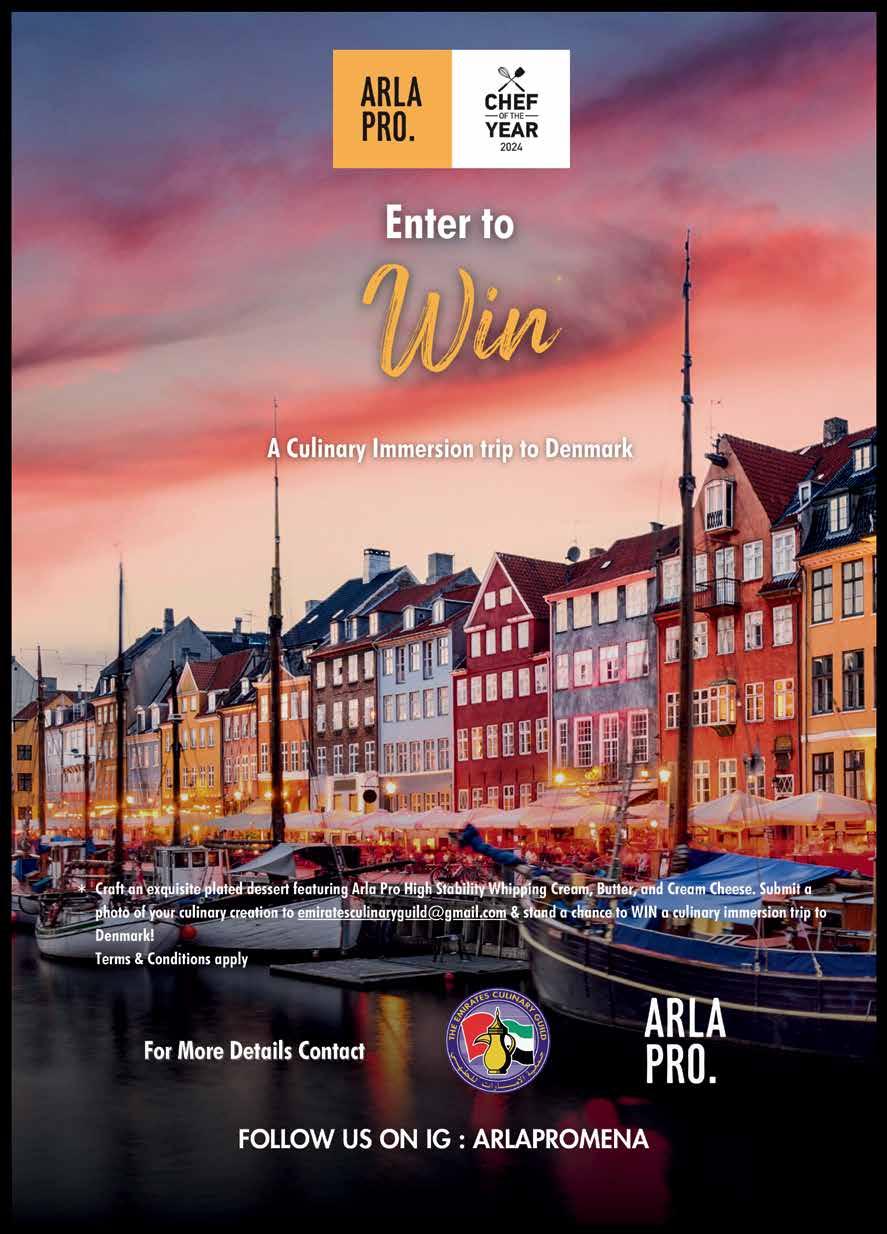




Chef Thushara Sanjeewa De Silva and Chef Amanda Ravisara Fernando have kneaded out the Salon Culinaire bake-off to claim the Best Baker title and bring home the Sounbula UAE Bakery Team Of 2024 trophy
The Food and Beverage Manager at AZADEA, Salim Doro, reveals his unique match with food, a culinary talent that was made in heaven

Chef Ruwan Kumara from Palace Downtown is vying for the Arla Pro Pastry Mastery Competition with a citrus zing

In conversation with a Chef Lorenzo Buccarini of Zenon Dubai on Lasagne al Forno, Tuna Tataki, MediterraneanAsia -Asia fusion and AI entertainment


UPGRADE YOUR BURGER WITH AWARD

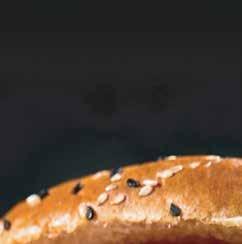
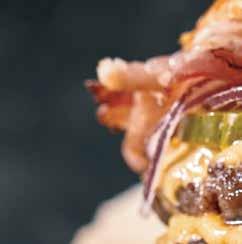
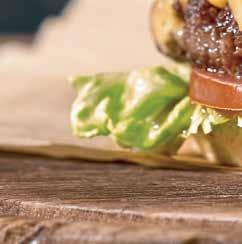

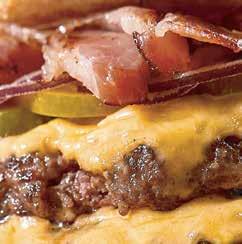


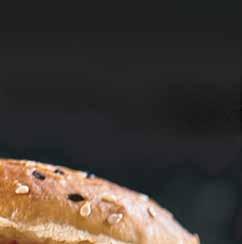

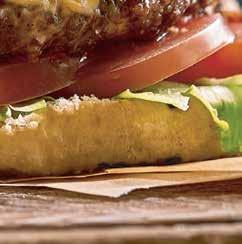




email editor@gulfgourmet.org
Dear Members and Partners,
We begin the summer months with a fantastic result from the International Emirates Salon Culinaire 2024, which was run alongside our partner event, Expo Culinaire, in Sharjah. We could not be prouder of the outcome, as this year is one of the biggest events we have done, with over 900 competitors from across the globe, eight bakery teams, eight international teams, and International Endorsement status from Worldchefs.
There are so many people to thank that we would need an entire magazine; however, over the coming months, we will see inside Gulf Gourmet winners and behind-the-scenes events of the competition and exhibition. The Salon Culinaire is organised by the Emirates Culinary Guild, the official national member association for Worldchefs, who have worked tirelessly for 32 years to bring the Salon to this level of international standards. This year was the 27th edition of the Emirates International Salon Culinaire.
To help with the proceedings, the ECG invited an international team of judges. A team led by our old friend Otto Wiebel, who has been with us for 25 editions, along with Past President of ECG Uwe Micheel, Chairman of Worldchefs Culinary Committee, Dr. Rick Stephen; Vice President of Worldch, Martin Kobald; Continental Director Europe Central for Worldchefs, Alain Hostert; and the entire committee of the ECG were all there to support.
This year saw the return of the Alen Thong Golden Coffee Pot Challenge for young chefs powered by JM Foods, and the guild thanks Mr. Rajan and the team for their support and dedication. The winner of this great trophy for young chefs was won by the team from the
Chinese Chefs Association (CCA) Young Chefs, while second place went to Hong Kong and third place went to the young men from Wales.
We also introduced a new practical cookery competition, The Sounbula Artisan Bakery Arena, where eight teams of bakers were competing for the title of Sounbula Mills Bakery Team of the Year 2024 and had to make a selection of bread and pastry items from scratch using only Sounbula flours with no pre mixes of chemicals or yeast. This competition was a true highlight and one we will continue to enhance as we move forward. Mr. Karim Al Azhari, the owner of Sounbula Mills, even expressed his admiration for the teams' performance at the inaugural event.
The Salon saw competitors from across the globe, and we also had a fantastic contingent of young Sri Lankan chefs who came to compete in the wedding cakes and open showpiece categories from The R.L. Clement Cake Decorating School. Master pastry and cake decorator and owner-chef R.L. Clement himself was present with his students, who took home great gold medals and other awards.
Competitions are an important part of what we do in the Guild, and without the support of our sponsors and corporate partners, it would not be possible for us to do this yearly. The partners truly make it happen. See inside for the list of partners that supported the chefs in the competition.
The graduation ceremony for the ICCA and ECG Culinary Scholarship took place on May 23rd. The 8th batch of young culinary scholars graduated from the program at the ecstatic Knowledge Village Dubai auditorium, filled with family, friends, industry professionals, and officials from Knowledge Village and Science Park.

Launched in 2015, this scholarship is internationally acclaimed as a unique scholarship aimed at underprivileged young chefs already in the industry but with no qualifications. Together with City & Guild, this program changes the lives of them and their families. Young chefs from across the UAE and from all types of establishments are chosen through a rigorous process, and we must thank the Managing Director of ICCA, Sunjeh Raja and Course Director, Shanaz Raja, for their incredible passion and commitment to these young people.
As we head into summer, the activities will slow down. Still, there is a lot on the way with the continuing ARLA Pro Chef of the Year competition happening and an anticipated Salon du Chocolat in September where we are planning to run a small Salon for pastry and bakery, so watch out for more information on this in the coming weeks. Our final monthly meeting for the season will take place on the 11th of June, and venue information will be sent out from the office. Keep an eye out for updates.
We thank the hotel management team and the culinary team of Sanjeewa Chamil of Radisson Blu Yas Island for the May meeting. They put on an amazing spread and took such great care of our corporate partners. Thank you, Chef Sanjeewa, for your team's support.
In closing, I thank each and every person involved in the Emirates International Salon Culinaire for their continued support of the Emirates Culinary Guild. Together, we are stronger.
With
Regards, Andy Cuthbert President and Editor
Gulf Gourmet chats with Salim Doro, to learn how he brings his business acumen to the
The Salon Culinaire is zooming in on Bakery talents. On our cover this month are Chef Thushara
Chef Helen recalls how she developed an appreciation for the housekeeping staff, the Executive Chef who introduced her to Nouvelle
and the significance of

EMIRATES Andy Cuthbert
CULINARY GUILD President +971 4 340 3128, theguild@eim.ae
Uwe Micheel Past President
EDITORIAL Andy Cuthbert Editor
Amaresh Bhaskaran Associate Publisher amaresh@amareshbhaskaran.com +971504568161
Vahiju PC Art Director
Abubakari Sadik Sulemana, a specialist in protein and livestock agriculture, is on a journey to demystify the assumption of every cut of beef is a steak
Chef Tarek Mouriess talks about the role of seasoned chefs in guiding young chefs to become humble leaders
Sonia Ashar discusses why the quest for food safety is more than regulation
Chef Carl Shi elaborates on the drivers of food waste generation
Chef Ruwan Kumara is bringing citrusy sunshine to the Arla Pro Pastry Mastery Competition
From helping his grandmother prepare Lasagne al Forno to conceptualizing dishes at Zenon Dubai, Chef Lorenzo shares his story of curating fusion flavors with a blend of forward-looking technology
Images from the recent Emirates Culinary Guild meeting
Quote Marshal
Chef Ponraj Daniel hankers for keeping it 'healthy' in both his venture and guild competitions
A listing of all the leading food, beverage, and equipment suppliers in the region
Chef Simon Says
Chef Simon takes us on a trend express, exploring the latest culinary fads and innovations of the season
COPYRIGHT All material appearing in Gulf Gourmet is copyright unless otherwise stated or it may rest with the provider of the supplied material. The publisher accepts no responsibility or liability for the accuracy of any information contained in the text or advertisements. Views expressed are not necessarily endorsed by the editor and publisher.
CONTRIBUTORS Shreya Asopa Atim Suyatim
PUBLISHED BY Emirates Chefs Guild, Dubai, UAE SALES ENQUIRY info@gulfgourmet.org
RICK STEPHEN
A luminary committed to empowering the Worldchefs community through competition and skill enhancement.
ANDY CUTHBERT
A champion of empowering the future generation of Worldchefs through culinary unity.

KRISTINE HARTVIKSEN
An advocate of the Green Chefs inclusion and culinary sustainability
ALAIN HOSTERT
A visionary dedicated to empowering the next generation of chefs through education.
UWE MICHEEL
A global culinary champion passionate about taking the industry to the next level through scholarship programs.





































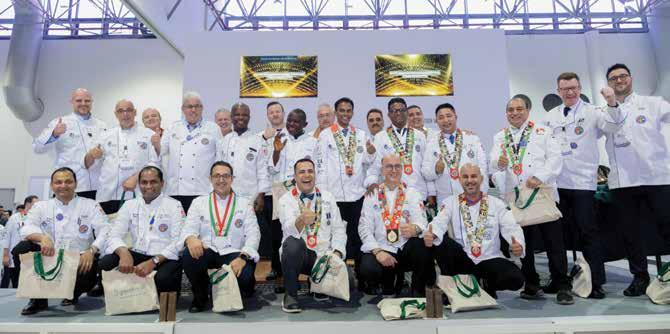
New classes, exciting competition, innovative products and services. The world of food came together at the Expo Culinaire
Exhibitions, education, training, chefs, pastry chefs, cooks, and bakers—all at one unique event— the International Expo Culinaire 2024. The event was a real "crowd-puller" with over 5,200 visitors all "under one roof" from May 20th to 22nd in 2024.
Over 900 chefs from the United Arab Emirates and 11 global countries competed in 39 classes across all disciplines of the culinary arts, including practical cookery, static displays, Emirati cuisine, cake decorating, and showpiece categories. The event held at Expo Centre Sharjah was a hub of innovation and an opportunity to network with industry leaders both from domestic and international backgrounds.
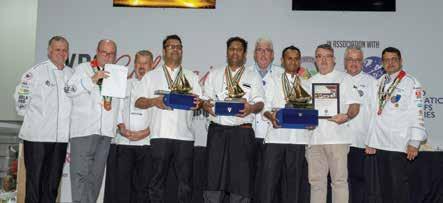
The eponymous International Salon Culinaire, also the largest competition in the Africa and Middle East region,endorsed by the World Association of Chefs Societies was held
simultaneously with the Expoculinaire exhibition at the event. Purple Kitchen Events once again organized the exhibition, showcasing a variety of culinary delights.
“The UAE has led the way with ExpoCulinaire 2024 being run alongside so many culinary competitions. We made the most of the strengths of all the individual parts of both competitions, exhibition to bring a complete food and beverage event to the Emirate of Sharjah,” said Joanne Cook, MD of Purple Kitchen Events. She added that the certified education sessions have become a pillar of the overall event, so being able to present them in 2024 with the partnership of ICCA Dubai, Emirates Academy of Hospitality Management, and Richemont Masterbaker added excellent value for all attendees.
President of the Guild, Andy Cuthbert mentioned that this year's competition was a clear indication of the increasing growth of culinary arts in the UAE. “ I am proud of the commitment from the entire committee and community of the ECG for the dedication they showed to ensure the competition was run to the highest level and the coordination with the host hotels for the Alen Thong teams was greatly appreciated, and we thank, Madinat Jumeirah C&I, Jumeirah Creekside, Radisson Blu Dubai Creek, Pullman DCC and Sofitel DownTown for their unwavering support to the international teams,” he said.
Uwe Micheel, the Past President of the Guild, expressed his delight at the continual improvement of the Expo Culinaire 2024, stating that "the standard
WINNERS OF ALEN THONG GOLDEN COFFEE POT CHALLENGE 2024
TEAM MEDAL
CHINA GOLD
HONG KONG GOLD
WALES GOLD
SOUTH AFRICA SILVER
AZERBAIJAN SILVER
UAE SILVER
SOUTH KOREA BRONZE
SRI LANKA MERIT
June-July 2024 Gulf Gourmet
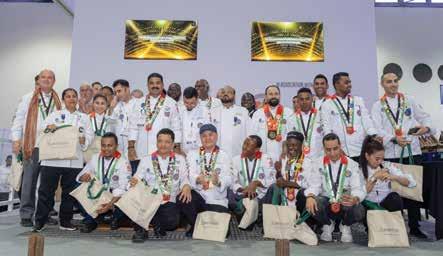
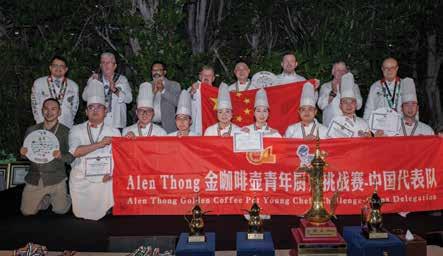
just keeps getting better year after year." He added that they were proud to have once again been able to put on the event, with the supporters of the guild. “We are grateful for the courage of the chefs and industry professionals for their support and presence throughout the three days and at the awards ceremony of the Expo Culinaire 2024. The competition was bigger than we could have hoped for and we are excited for 2025 already,” added Micheel.
WINNERS AT SOUNBULA MILLS
ARTISAN BAKERY CLASS 2024
COMPANY MEDAL
EKFC TEAM 1 MERIT
EKFC TEAM 2 BRONZE
QATAR TEAM SILVER
ERTH ABU DHABI SILVER
THE WESTIN GOLD
JUMEIRAH AL NASEEM GOLD
ADDRESS THE VIEW SILVER
In a historic event, 23 international judges alongside UAE-based judges presided over the culinary spectacular this year. The Chinese Chefs Association received a Gold Medal with Distinction. In addition, 149 Gold Medals, 200 Silver Medals, and 277 Bronze Medals were awarded during the competitions over the three-day event.
Moreover, a new practical cookery competition was introduced this year where eight teams of bakers battled it out for the prestigious title of Sounbula Mills Bakery team of the year 2024. The competition challenged participants to create bread and pastry items from scratch without any additives and premixes.
This year the Salon Culianire again featured the Alen Thong Golden Coffee Pot Challenge for young chefs. The competitions were fierce and the camaraderie thereafter made it all worthwhile. Hearty congratulations to all the winners!
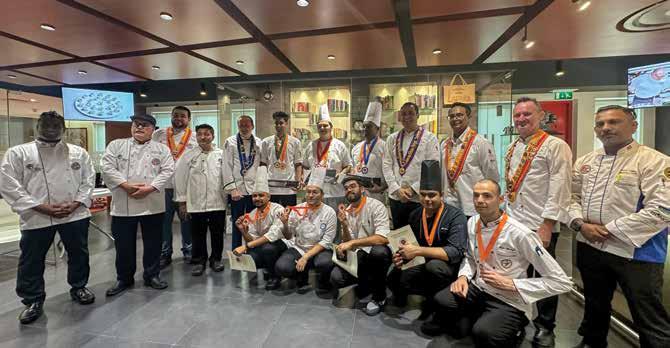
The 9th Chaine Jeunes des Rotisseurs competition was held in the UAE on May 3, 2024. The competition took place in the Kitchen of ICCA Dubai, where eight young chefs from various UAE hotels and restaurants battled it out with the support of their executive chefs and managers.
In a notable transition, Chef Majed Al Sabagh took on the organization of the 9th edition of the event, which was previously spearheaded by the Guild's Past President Chef Uwe Micheel. With the support of the Emirates Guild and esteemed colleagues, Chef Al Sabagh was able to successfully plan the event.
The panel of judges were professional certified judges from the Worldchefs and also members of the Chaîne des Rôtisseurs UAE. “They were divided to assess different aspects, such as hygiene and skills, while also monitoring the time. Furthermore, the tasting panel evaluated the delectability of dishes, their artful presentation, as well as other key factors contributing to a quality dining experience,” said Chef Majed Al Sabagh.
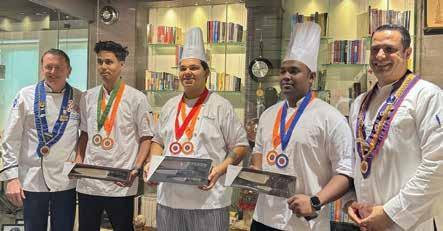
Along with him, the judging panel comprised of esteemed chefs including Chef Alan Orreal, Chef Harold Oberender, Chef Fadi Malohi, Chef Manzoor Balghari, Chef Weyn Gebhardt, Chef Saman, Chef Dammika Herath, Chef Amro Alyasin, and Chef Rabeh Amer.
“This would not have been possible without the generous backing of our sponsors. The ICCA provided us with the venue; Barakat as every year provided us with essential black box ingredients, and HK Gourmet by Chef Sumeda provided us with top-quality
meat and poultry," expressed Chef Majed with gratitude.
Chef Alan Orreal, a member of the international culinary judging panel for the Jeunes Chefs Rotisseurs competition, evaluated the international final of Chaine Jeunes des Rôtisseurs.
Over the past four years, Chef Alan has had the honour of critiquing culinary talent from around the world at finals held in locations such as Calgary, Canada, Mexico City, Istanbul, Turkey, and most recently Budapest, Hungary.
Giving specifics about the experience, he says it provided him with an understanding of the philosophy behind the Chaine Jeunes des Rôtisseurs Black Box competition and its detailed set of judging and operating guidelines.
"I was thrilled to be present for this year's UAE national competition to guide the judges through the rules and the judging sheets so that they would comply completely with the international standard and process," said Chef Alan Orreal.
Chef Alan added that the well-equipped, spacious ICCA kitchens provided the perfect environment for the competitors to stretch themselves and their skills in an exciting competition of flavourful plates for the judges.
He expounded, "The Black Box itself was full of tantalizing assortments of premium ingredients such as Patagonian Toothfish (Black Cod), Beef Filet, a Whole Chicken, mango, berries, vegetables of many kinds, and a common table of spices and general kitchen committees to choose from."
Check out the young culinary talents who competed
Joshua Jonathan from Madinat Jumeirah
Radhe Krishna Shaw from Zabeel House by Jumeirah
Dimuthu Lakshitha Munasingha from Hilton Dubai Jumeirah
Prajak Chindakar from Earth Hotel Abu Dhabi
Tarun Mehrotra from Zero Gravity / Dubai Marina
Gowtham Padmanabamurugan from Novotel IBIS
Obada Al Sabbagh from Le Beirut restaurant and café
Bradley Raphael from La dame de Pic
*With Inputs from Chef Majed Al Sabagh and Chef Alan Orreal
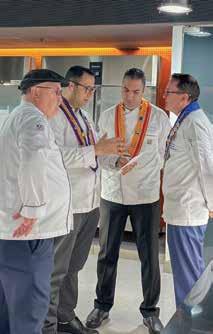
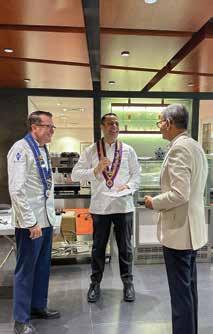
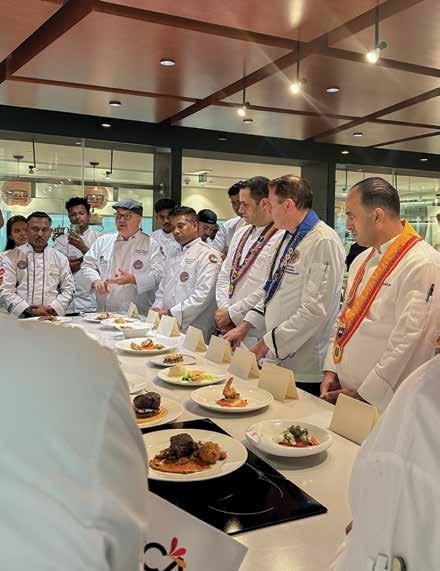
To get your chef or company related news featured in this section, email editor@gulfgourmet.org
A Peek at the UAE team creations at the IKA Culinary Olympics 2024
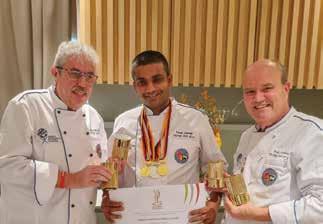



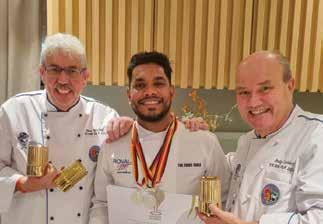

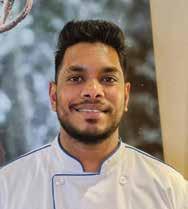



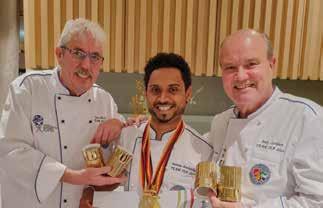










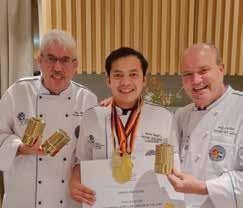

Food came as a soft power of art, a dimension he never realized was missing from his world of economics and geopolitics. Gulf Gourmet chats with Salim Doro, to learn how he brings his business acumen to the culinary experiences as the Food and Beverage Manager at AZADEA
Salim Doro knows how to seize opportunities, whether they are just around the corner or even next door. One fine day, he knocked on his neighbor’s door, who happened to be the Head Chef at Applebee’s. “I asked for a commis job and my neighbor agreed. I was in the kitchen the next day,” he shares. He may have approached his nascent career with nonchalance and his connection with cooking ostensibly, chalk and cheese. But this ‘carpe diem’ perspective has led him to climb the ladder in the industry.
As a culinary neophyte, his first day was spent chopping veggies, blanching them, and portioning them. He was slow, and the kitchen swirled around him.
“From the get-go, I harbored reservations about pursuing a career as a chef,” he confessed, noting that despite his initial apprehensions, he returned the next day, drawn back by the friendly working atmosphere and great Chef, who was his pillar of encouragement.
He dedicated his mornings to university studies and hustled in the kitchen until the stroke of midnight.
The schedule made him an expert at
It was my arranged marriage with cooking where, over time, we fell for each other
wearing a dozen hats. Despite his initial disdain for his job, he found a strange affinity for the chaos of the kitchen, criticism, appreciation from patrons, and lessons in time management and adaptability. One lesson, however, stood pivotal: the concept of power shift, where every day, the team convened 15 minutes prior to receiving a briefing on what to anticipate in the upcoming shift. “These briefings empowered us to work efficiently. When I was promoted to trainer at Applebee’s, I turned this routine into a philosophy, ensuring the team had power shifts. I trained them with the basics, refining the sessions with a logical approach,” he elaborates, adding that even those initially half-hearted about the program found themselves immersed in the learning journey.

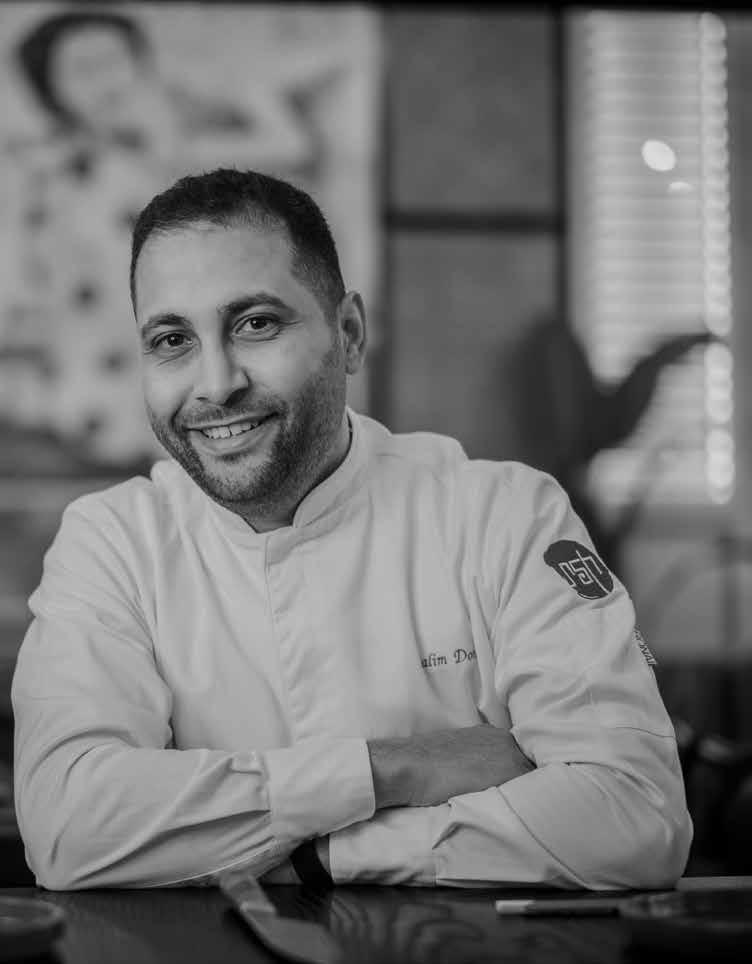
Over time, he efficiently buried the pressure and eventually earned the position of Assistant Kitchen Manager. Despite having all the ingredients for success, there was a void that lingered within him. The nub of the matter was his passion for cooking. Ironically, it wasn’t until the arrival of the ambitious young chef that his true passion for cooking surfaced. “That chef was a real chef. He was good at carving apple watermelons, making artistic presentations, and collaborating with the team. And he inspired me,” he says without hesitation.
After months of perfecting his skills at Applebee’s, Chef Salim’s life took a turn when he interviewed for P.F. Changs. Just 22 and freshly graduated, he aced the interview with his impressive knowledge of food safety and hygiene, securing the role of chef de partie.
Packing his bags, he moved to Kuwait for a three-month training program with brand and come back along with big team to support with Lebanon opening.
In detailing his approach to leadership, he points out that trust is paramount. A memory lights up his face when he thinks about his experiences in Lebanon. “A day before the audit, the senior chef instructed me to clean the restaurant thoroughly to prevent any mistakes. The next thing was taking a power shift and motivating the team. We worked together, cooking during the day and cleaning at night after serving over 100 diners. We surprised the management, who found no faults, and that strengthened the bond of trust.
He is grateful for the support of many chefs, but he holds a special admiration for Chef Ed Abdallah, the Corporate Chef, who recognized his potential and encouraged him to expand his horizons by sharing his skills in countries like Jordan, Turkey, UAE, and Qatar. In these places, he had the privilege of contributing to the opening of new
Chefs have militarygrade discipline. We work in a timely manner, even under pressure, handling both physical and financial variables, while managers work only with numbers
branches and supporting teams, an experience that humbly shaped his culinary journey.
He reflects on the significant transition from Lebanon's culinary landscape, where sales were modest, to the demanding environment of the GCC, where he faced the challenge of meeting higher expectations while maintaining quality and timeliness.
"This experience humbly cultivated my multitasking abilities and attention to detail, shaping him into a more adept and conscientious chef." he says.
Chef Salim ardently maintains the belief that individuals must identify a promising trajectory in any company before committing.
When he was offered an interview at Azadea, he felt a sense of security pervading from the moment he stepped in. Upon learning about the promising prospects of the group and the multitude of growing opportunities, he was certain about adding value to the company. “At that time, Alain Kassis was the brand manager at New Shanghai, and we had a longstanding history that traces back sixteen years to our days at Applebee’s when we started our career together. Besides the connection, I also
wanted to build my own story. During the interview, we spoke about why the story is important as it shows someone can deliver,” he elucidates, explaining the reasons that drove his switch.
Having transitioned seamlessly between the attire of a chef's jacket and a sophisticated suit, he has cultivated a keen receptiveness to market feedback. This includes insights gleaned from guests, which have significantly contributed to the refinement of his menu offerings. Adopting a lean management approach has further enhanced his abilities, allowing him to gain valuable perspectives not only from a culinary standpoint but also through a strategic lens. This encompasses activities such as tailoring offerings, managing expansion, and evaluating investments with precision and foresight.
Even as the brand manager, he has kept sight of his chef skills; he makes it a point to be in the kitchen when possible to make informed decisions, understand the resources, and bridge the gap. The Executive MBA course at the ESA/ESCP business school has also done its bit. Currently, in his second year of the program, Chef Salim has soaked up a wealth of knowledge and gained exposure to business principles, which has transformed him into a different person.
If you asked him the most complex question about chefs pivoting into business positions, he would smile as he opines on the unique advantages possessed by culinary professionals over traditional managers.
“Chefs have military-grade discipline. We work in a timely manner, even under pressure, handling both physical and financial variables, while managers work only with numbers. I not only manage financial data but also check the quality of ingredients. If even one item is off, I immediately figure out that the marinade is incorrect.”
While his dedication to his career has set him apart in the industry, it has also painted him as a natural who can effortlessly cook with ingredients. Through years of experience, he has developed a taste logic so sharp that when presented with a lineup of ten ingredients, he can pluck out the perfect companions without missing a beat.
Back when Chef Salim was just a culinary minnow in the gigantic ocean of the industry, he had a distinct plan for himself. He was in subordinate roles when others managed his schedule, but he aimed to be the captain of his calendar. And now that he’s achieved this, there’s no stopping him. Of course, a small restaurant serving 40 to 50 people is one of his future goals.
“The restaurant will target a niche market, operating as a singular branch with a concise menu offering 12 to 15 dishes. The primary focus will be on using raw materials that are free of genetic modifications and allergens, utilizing organic and nutritious ingredients, to provide an experiential dining experience versus just a diner,” he reveals, clarifying that it’s a dream on the horizon as he still has a lengthy path ahead with corporate companies that have introduced him to a learning curve.
Over the years of sailing the seas of his love-hate relationship with food, he has finally found a way to define his culinary connection. “In the past, our parents used to arrange marriages where love either bloomed with time or the marriage would go south. It was my arranged marriage with cooking where, over time, we fell for each other,” he confides, his words flowing poetically.
While his food alliance has been arranged, his marriage is one of love. In 2017, the same year he joined AZADEA Group, Chef Salim tied the knot. The couple has a three-year-old son, Karl, who shares his father’s passion for food. Chef Salim’s food scrutiny flows into his parenting instincts as he
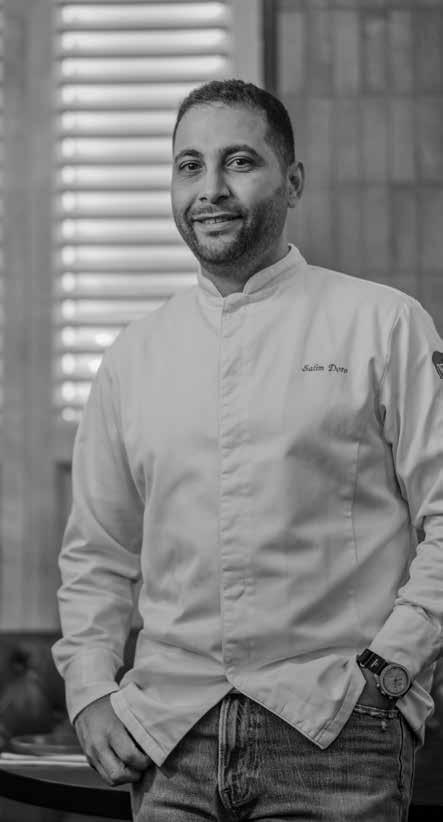
strives to steer young Karl towards nourishing alternatives away from heavily processed foods. At home, one of his favorite cuisines to cook is Italian, whipping together some pasta pomodoro with flavorful sauces. But that’s not all—he’s also got a liking for Mediterranean Turkish, Japanese, and
Lebanese dishes. “Just last week, I made noodles, and it only took me 5 to 10 minutes to combine the ingredients and sauces and get a balanced flavor.”
Taste a spoonful of the noodles, and you know Chef Salim’s match with food was made in heaven.
Thushara Sanjeewa De Silva and Amanda Ravisara
Fernando, winners of the Sounbula UAE Bakery Team of 2024, shares how they became stars in bakery dough-main

For the first time, the Emirates Culinary Guild brought a new twist to the red-letter event, Expo Culinaire, with a live Sounbula Artisan Bakery Arena. Over three days, eight teams of two rolled up their sleeves and put their baking skills to the test by preparing a lineup of breads and pastries, such as French baguettes, sourdough, dinner rolls, croissants, pain au chocolat, Danish pastries, and puff pastries. Sounbula Mills and a German baking equipment company, Miwe,
teamed up to bring the practical baking competition to life.
Renowned as the global leader in baking technology, Miwe imported state-of-the-art equipment exclusively for the Guild at the Sounbula Live Arena, while the flour partner Sounbula Mills provided custom-made flour types to be used in all applications of the baking of bread. "Great flour makes great bread. We provide special flour made from high-quality ingredients to let the
Bread is the king of the table and all else is merely the court that surrounds the king. The countries are the soup, the meat, the vegetables, the salad but bread is king — Louis Bromfield
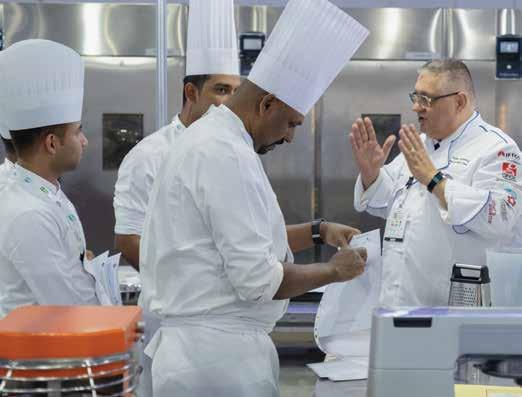
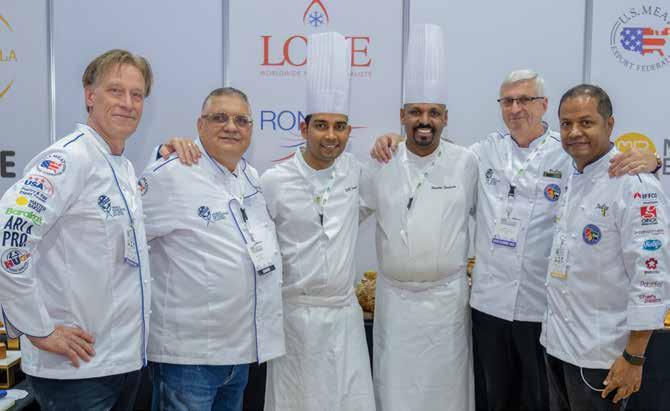
bakers finish their products without worrying about the flour," stated Mr Karim Al Azhari, owner and managing director of Sounbula Mills.
After 25 years of the need for speed on the race track, Mr Azhari traded the thrill of motorsports for his current role, which
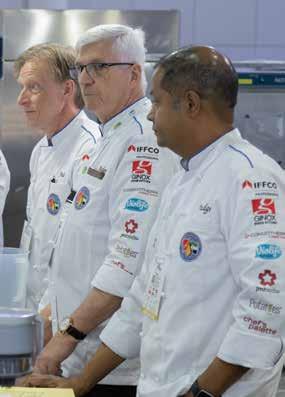
is more like navigating a flowing river full of unexpected twists and turns. "I have to admit, baking is tougher than racing. It is a demanding job, and every day I have something new to learn from chefs," he said.
According to him, the competition was enthralling, a platform for the bakery industry that simply needs more recognition, with their efforts focused on rekindling admiration for the skilled artisans who are often behind the scenes.
"This unique competition, free from premixes, bread improvers, and additives, was born out of our multiple discussions with Chef Andy and Chef Uwe. A competition in a bakery just with water, salt, and flour—ingredients that have been used since ancient times," said Chef Jurgen Ellenbeck.
The owner of House of Breads and a senior judge, Chef Jurgen, took this live baking showdown as a one-of-akind event, something extraordinary for artisan bakers to experience. "Since sourdough requires resting time, our first day was dedicated to observing bakers preparing everything and the second day to finishing everything before we evaluated it," he said, highlighting that baking is a precise science where
Young chefs at the competition created breads that rival those found in top bakeries with perfectly laminated dough and intricate techniques
competitors must adhere to the recipe by weight, monitor water temperature, and pay close attention when placing the dough in the oven.
No Piece of Cake
Judging the competition, Chef Jurgen found waste to be a key factor and tough criteria to evaluate. "We do not allow wastage. You cannot bake six breads and show us the finest three. The biggest aspect is sustainability—no waste, cleanliness, and an organisational attitude. And then, of course, taste takes the lead," he explained.
In the age of shortcuts, opening a premix bag with no special skill may seem simple;
however, it's the skilled bakers that stand out in competitions by flawlessly executing tasks with professionalism and showcasing their baking knowledge and craft right from scratch.
Chef Peter Boos cannot agree more. With 14 years of experience at Emirates Flight Catering and six years as a judge, Chef Peter was blown away by the creativity put forth by the participants in the cooking competition. " Young chefs at the competition created breads that rival those found in top bakeries with perfectly laminated dough and intricate techniques," he said.
He filtered the focus on the art of baking, affirming that artisan baking is not dying out. "It is definitely a time-consuming art. But baking has become more extensive, both in homes and hotels, with demands for bespoke products. There's nothing like really good bread; it should not be

forgotten. Bread is served in every culture in the world and is a part of the diet everywhere. It truly is a labor of love."
Feeling at ease even in the crucible of intense competition is challenging. Yet,
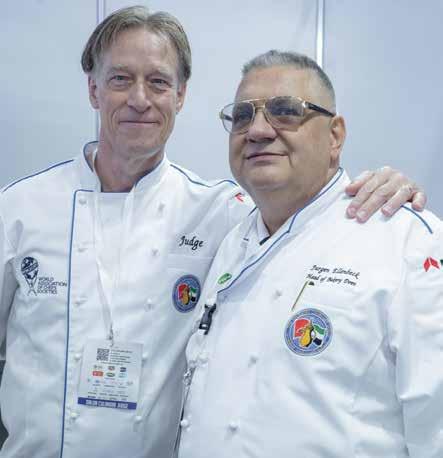
it is healthy competition, Chef Günther Koerffer elucidated, that motivates you to give your best. The advice he hands out to unlock the win is not just training and preparation; competitors must have a quick fix in their backpacks. " In competition, everything is new—from the table to the tools—so they must be risk managers too. You have to know what to do if something goes wrong," he added.
Chef Günther Koerffer, the President of the European Confederation of National Bakery and Confectionery Organisations (CEBP) and the President of UIBC, the International Union of Bakers and Confectioners, began his baking career in Germany. Since then, he has travelled far and wide, worked as a Royal Baker for the prestigious Swedish Royal House, and is
Great flour makes great bread. We provide special flour made from high-quality ingredients to let the bakers finish their products without worrying about the flour
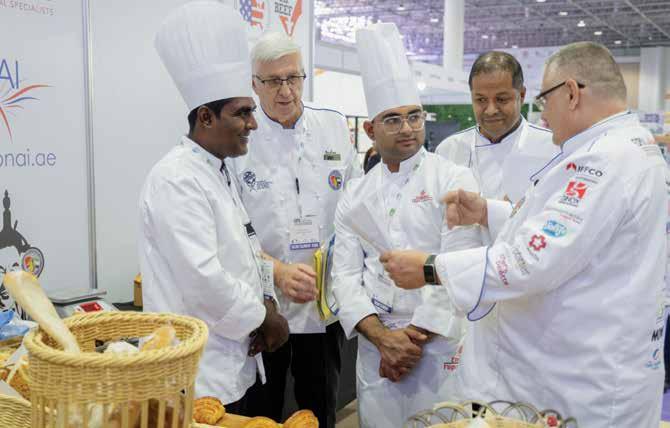
a seasoned judge, assessing at various culinary competitions worldwide.
Bringing rather a fresh perspective to the competition that is usually encircled by practice, patience, and perseverance, he underlined that the most crucial aspect of the competition is to nurture the competitive spirit. "People of my age have gifts to offer to humanity. Instead of stifling them during competition, we should support the growth of these young chefs. We are in an age where we have a certain kind of knowledge that we must pass on," said the 70-year-old, who continues to be a passionate learner.
For him, the most important thing is baking without borders, free from politics. The significance of bread as a symbol of life and unity for thousands of years is a value he holds dearly. "We are one big family, and that is a value we should spread. Bread has always been about humanity, not owned by any one individual." His remark remains unequivocal and crucial.
As a purveyor of artisan bakery goods, he explained that the revival of original concepts was attributed to people seeking healthier options. He pointed out that mass-produced companies
I have to admit, baking is tougher than racing. It is a demanding job, and every day I have something new to learn from chefs
were not necessarily evil, but their use of additives was a necessity for packaging and transportation, creating a noticeable difference in taste from the handcrafted breads. His cognisance about changing trends in consumer preferences is readily apparent at his company in Sweden where he and his son serve customers sourdough bread, praline, ice cream, and cakes.
Another senior judge who was enthusiastic about bringing back the spotlight to bakers who may have been overlooked in the industry with the advent of machine-made products was Chef Bernard Charles, Culinary Director of Café Bateel.
Contrary to the popular assumption that all is rose-coloured in artisan bakeries, even with the hospitality industry relying on company-made breads, Chef Bernard knows that there is still a need for a push for quality, handmade bread.
"Unfortunately, artisanal baking is dying out. I truly hope that the hotel values their bakers, who work through the night to ensure that breakfast is ready with fresh bread hours before guests dine. Quality over quantity is important. This year, we saw quality in these teams who are working with great dedication," he said, adding that quality and patience were both important in winning.
His advice for bakers participating in competition is clear: follow the rules. "Most of the time, people do not read the instructions. Read the guidelines and practice. Before you go to a competition, practice a lot in order to avoid losing points," he stated.
Knead to Succeed
There was a duo who not only played by the guidelines but got their trademark lamination, scoring to create a rhythm in bread-making. Amaresh Bhaskaran caught up with the winning team of the

two bakers, who revealed what kind of conviction it takes to win as best bakers.
Chef Thushara Sanjeewa De Silva had made a comeback to the live baking competition circuit after bagging a flurry of wins a decade before. Even after all these years, he has held his charm, reignited by the hunger to excel once again, leading him to the best baker title at the 27th Emirates International Salon Culinaire.
The Sri Lankan chef is no stranger to victory in culinary competitions. In 2011, he clinched two Gold medals for the croissant challenge and static display of Artisan bread. The following year, he won a Gold for Morning Danish Pastry at the Salon Culinaire.
He is grateful for his many
We are one big family, and that is a value we should spread. Bread has always been about humanity, not owned by any one individual
achievements. "Some 13 years ago, I received gold and silver medals in different bakery classes, and now we have been awarded the prestigious Best Baker title. I feel happy about this achievement, and I thank the Guild and Chef Jurgen," he said with a little crease
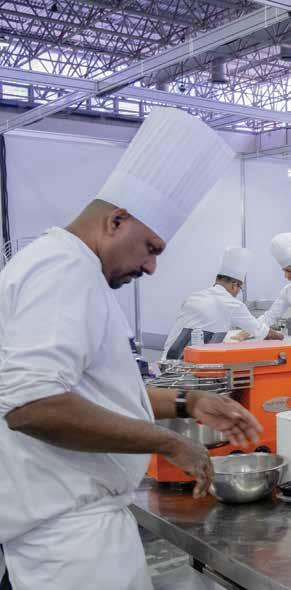
of eyes at the corners, doused in the euphoria of victory.
Ahead of his competition, Chef Thushara laid out his winning strategy, one that required him to always be on the floor, checking the dough and multitasking like a pro. Another aspect of his plan was to love the art of baking. He passionately believes that baking is more than just following a recipe; there's a feeling that comes with it. " When you touch the dough, you can feel what technique needs to be used. So, just go with that feeling when you're baking.”
We were amazed at how skilled he was with all the different types of bread. Completely stumped, we asked for his secret. He simply stated that it was all in his 25 years of experience. "I've practised multiple times with
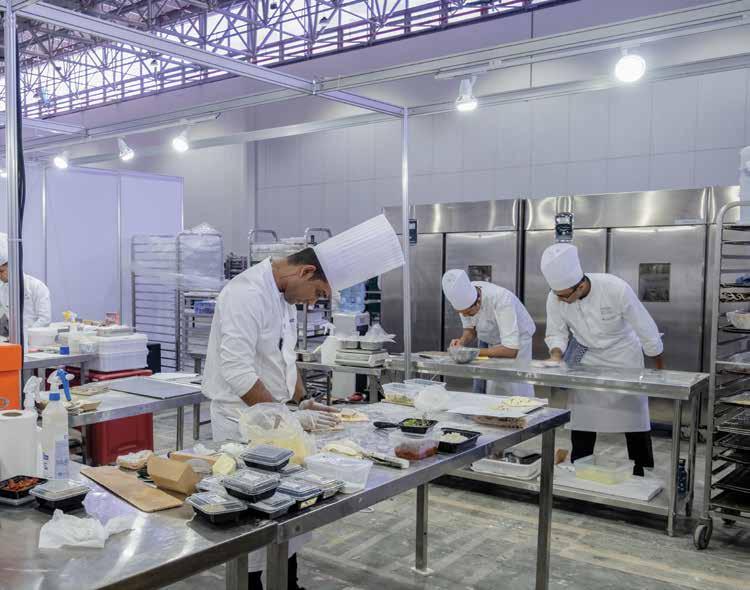
all different types of bread using the Sounbula flour and carefully monitoring water and flour temperatures. I relied on my old skills to get the perfect outcome. And, of course, my assistant chef, Amanda, was there to lend a hand," he added
It's been a long road full of bumps and twists to reach these milestones. Chef Thushara's journey in the UAE began in 1999 when the Burj al Arab Hotel was opened, and an opportunity fell into his lap. "It was the hotel's pre-opening, and I worked there for over three years, climbing up the ladder from commis to chef de partie."
At the end of 2007, Chef Thushara made his way to Le Meridien Mina Seyahi Beach Resort. Quiet early on in his career, he started mentoring
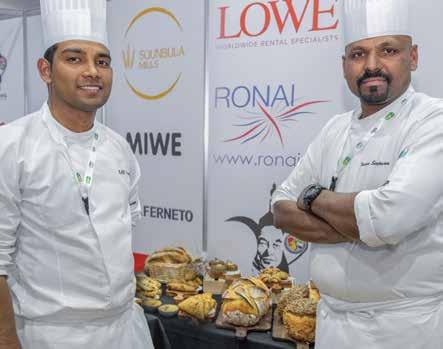
budding bakers, generously passing on his expertise and seeing them reach overarching positions.
For the past 17 years, Chef Thushara has been overseeing bakery operations for the Westin Dubai and Le Meridien Mina Seyahi Beach Resort & Marina. "I have a team of 14, and we make everything from scratch at the hotel. During the busy period, we mix 300–400 kilos of flour, make 40 kilos of focaccia, and some 25 kilos of sourdough, so we work in huge numbers. This is my bread and butter. So, I work tirelessly to refine my skills every day, putting in 13 to 14-hour shifts."
Like a ship without a crew, victory cannot be achieved without the support of your team. A talismanic presence in their win was Chef Amanda Ravisara Fernando. Constantly meting out assistance with his face gazing at the food station, he carved the bread with his artistry, following wholeheartedly the trajectory set by Chef Thushara.
Chef Amanda is new to Dubai, having arrived earlier this year from Sri Lanka. As the junior sous chef at the Westin Mina Seyahi Complex, he has quickly learned how to manage bulk operations
When you touch the dough, you can feel what technique needs to be used. So, just go with that feeling when you're baking
and production planning under the guidance of his mentors.
Ask him about his win, and he will still keep smiling. A winsome light comes to him naturally. "It was a golden opportunity to work side by side with Chef Thushara, pitching in to put the finishing touches on dishes, helping in proofing, decorating the bread, and following his every instruction to the letter so he could focus on the bigger picture," he said, noting that together they have achieved success.
Clearly, it's been a good year for him. What's your future plan? "I want to be like Chef Thushara, a head chef," said
the 28-year-old, prepared to tread the established path paved by his role model.
Chef Thushara's advice for bakers entering the competition—likely what you figured out—is to give the best and improve their skills. "Do your best; learn from mentors; learn new techniques; don't be afraid; don't be upset; follow your heart."
Like a golden trophy gleaming with promise, his ambitions shine bright. Each step of learning brings Chef Thushara closer to his dream when one day he opens his own bakery hotel school back in his country. "Baking is not easy, but it is rewarding. You feel good when you smell the bread; you are creating a recipe that has been passed down for thousands of years. Customers are happy when you make good bread. I am not saying ready-made bread is not good; it depends on your hotel manpower and resources, but for me, baking from scratch is important," he says.
The live Sounbula Artisan Bakery Arena Class had put artisanal baking on the map, igniting conversations in the industry. It's a precursor to many exciting developments in bakery innovation. For those with a taste for good bread, that's music to their ears!
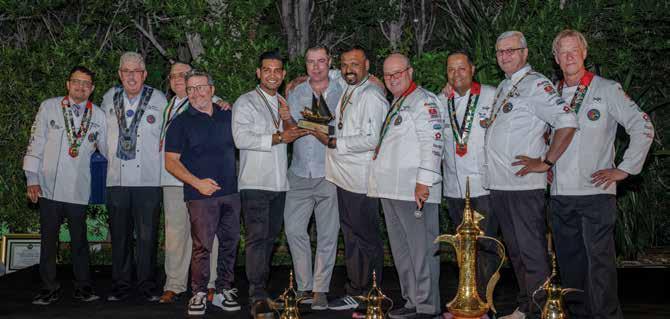










Chef Helen reminisces the pivotal moments that made her develop a deep respect for the housekeeping staff, and the importance of networking in the culinary industry
When the door slammed on my cruise ship dreams and the dazzling prospects of the big city, I realised it was time to start at square one, though my confidence was as bruised as a peach in a grocery bag. So, I wound up at a quaint country hotel, a stone’s throw from where I grew up and right next to a golf course. This little gem doubled as a golf retreat and a wedding hotspot. Owned by a private family and nestled in gorgeous grounds, this place marked the humble beginnings of my culinary journey—right up until I flew the nest two years later. Did I pick up any groundbreaking skills there? Well, not exactly. But it's where I found my mojo, learned life’s little lessons, and got a kick out of the camaraderie.
Taking charge of my section, I basked in the warm glow of guest compliments on our straightforward, honest cooking, which spotlighted local produce. We might have been a small team, but our reputation was mighty, and I was darn proud of it. Our kitchen porters, two phenomenal ladies, were the life of the party. The laughs we shared. Absolutely priceless.
Back in those days, paydays were weekly highlights—receiving that little brown envelope stuffed with cash made my week every time. I still miss the tangible thrill of our boss handing those out. On my days off, driven by a newfound appetite for
Every chef's path has its share of spills, thrills, and belly fills
cash, I moonlighted in housekeeping, especially when the hotel was bustling. Cleaning up after golfers? Let’s just say it wasn’t always a walk in the park. But it taught me to respect the hard work of housekeeping staff so much that I still tidy up my hotel rooms on vacation.
I also helped with the breakfast shift, starting at the crack of dawn and wrapping up by noon, leaving the rest of the day for, well, not sleeping, that’s for sure. Despite the early starts and the busy shifts, those days were incredibly rewarding, and I picked up skills that went beyond the kitchen. I always tell my students: grab every opportunity, even if it’s just once. You never know what you might learn or where it might lead. And who knows? Maybe one day, you’ll look back fondly on these early challenges, just like I do.
After lounging comfortably in my culinary comfort zone for a couple of years, I realised it was time to stir things up—my career was simmering on too low a heat. So, I packed up my knives
and headed to the southeast of the UK, to Berkshire, where I landed a Commis position with the small luxury hotel group perched on the scenic banks of the River Thames. This was it—I was stepping up my game.
The hotel was in a stunning location, my first big-league spot with a kitchen team of 12 to 16 chefs. And he was, the vision ... the EXECUTIVE CHEF! A figure so sharp in his pressed white chef's uniform and towering hat that I half expected him to autograph my apron. He was like a culinary celebrity, fresh off the glossy pages of a gourmet magazine, and I was absolutely starstruck! His business savvy, unwavering professionalism, and formidable work ethic were truly inspiring. He crafted menus that were way ahead of their time. He introduced me to what we called Nouvelle Cuisine at the time, crafting innovative dishes that were probably too avant-garde for our guests who likely preferred simpler fare. Nevertheless, I treasured that menu like a secret recipe book, and I still have the copy today. From him, I learned not just about food but about the sheer dedication needed to excel in this fast-paced world. He set the benchmark for my career and became my unwitting role model.
In Berkshire, I landed in a kitchen teeming with seasoned chefs and one particularly impressive German pastry chef who could probably decorate cakes
You never know what you might learn or where it might lead. And who knows? Maybe one day, you’ll look back fondly on these early challenges, just like I do
in her sleep. Picture this: she'd hold a cake in one hand and spin it like a DJ on a turntable, all while her other hand piped flawless designs with the precision of a laser printer. I'd never seen anything like it before—my fellow pastry chefs, if you're out there, back me up! She nearly seduced me into abandoning the hotline for the sweet allure of pastries, but my heart remained loyal to the bustle of the main kitchen.
My stint there wasn't just a culinary education—it was a masterclass in networking. It turns out, in our industry, it's not just what you know but who you know that can whisk you to your next job. And boy, was Berkshire bustling! In the culinary industry, you might send out a million resumes, but often, it's that one introduction at a chance meeting or an F&B party that lands you your next role. And oh, the names around us— John Burton Race, The Great House at Sonning, Mallory Court, Cliveden House, the Roux brothers and their prestigious restaurant, The Waterside Inn at Bray. We were smack in the middle of a foodie wonderland, with Windsor and Bray nearby, the latter leading to the legendary Heston Blumenthal and his culinary palace, The Fat Duck.
We were also a stone's throw from Oxford and London, right in the gastronomic heartland. It’s funny how in this business, the food scene is so tight knit that a friend of a friend or a casual
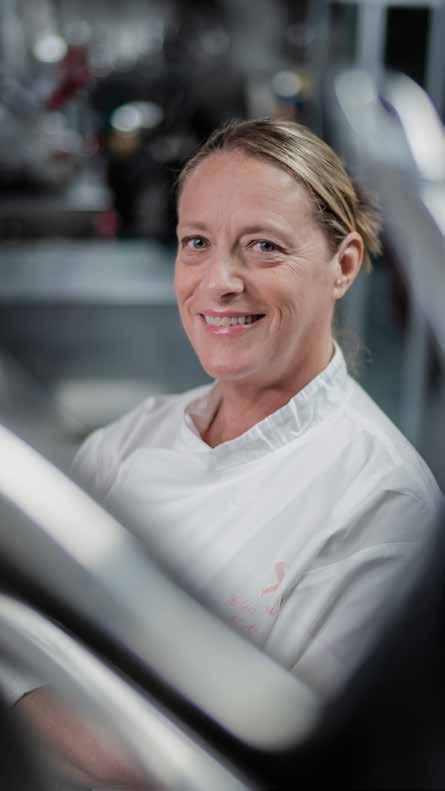
chat over a cool beverage could open the doors to the next culinary adventure. And that’s precisely what happened to me—one chef, one handshake, and bam, my culinary fate was sealed. The next chapter was just a soufflé’s rise away!
But hold onto your chef’s hats, because there’s a whole buffet of stories from my Berkshire days still on the menu—both in
and out of the kitchen. So, as we prepare to plate up the next course of my career journey, remember: every chef's path has its share of spills, thrills, and belly fills.
Stay tuned for more tales that prove life in and out of the kitchen is anything but bland!
Chef Helen
A mere setback in the culture meat industry but a lot of hope on the horizon writes Shreya Asopa
Six years ago, Nithin Shetty made an eco-conscious decision by transitioning to vegetarianism. Although he has committed to a new lifestyle, he still occasionally craves meat and seafood.
Many like him, who have chosen to abstain from meat to steer clear of sustainability guilt, are turning to cultivated meat as a possible game-changer.
"It is not like any plant-based variants, which, for many non-vegetarians, is assumed as a supplementary food to the original meat. If we want people to move away from meat, we need to give them an alternative, such as an orangeto-orange comparison, not an applesto-orange comparison. And that's where cultivated meat makes a lot of sense for us," says Nithin Shetty, co-founder of Klevermeat, India's first cultivated seafood company.
What began as a promising year in 2021 for Nithin and Dr Swapnil Kamble, a cell biology PhD, with them winning the Good Food Institute's Indian Smart Protein Challenge, lit the way for opportunities, including securing early-stage funding from Better Bite Ventures in 2023.
Currently, their lab is working on Cultivating Penaeus Vannamei (Whiteleg Shrimp) and by the middle of 2025, they will have a proof of concept (POC) showcasing bite-sized shrimp. "Even with the POC and approvals,
If you are facing a media development issue, it is important to invest in a model that is tailored to address that specific issue, such as GEM modelling
the challenge will be to make it more affordable compared to the current prices of traditional shrimp in India. Achieving price parity will take time; however, sooner or later, we will introduce this technology to the public at large," says Shetty.
India, as per the Seafood Watch reports, produces nearly 1 million metric tons of this shrimp variety annually. While the front runners of the Indian meat industry (private industry and local butchery) may perceive it as a credible threat, Shetty suggests that exploring government involvement in innovation presents a brighter future for all stakeholders involved.
A step does seem to be taken towards public-private partnerships with
the initiative of the Central Marine Fisheries Research Institute and NeatMeats collaboration on cultivating lab-grown fish in India.
Despite investments and collaborations, Shetty points out that India still needs to catch up in terms of understanding cultivated meat compared to its global counterparts.
Sruthi Sadanand, formerly at the helm of the product development team at Shiok Meats (a Singaporean cultured meat and seafood company) and later as a partnerships manager at the Cultivated Meat Modeling Consortium (CMMC), has been a firsthand observer of the industry’s evolution.
According to her, this field has progressed from shortage of research papers dedicated to specific species to establishment of standardised operating procedures (SOPs), to the arrival of hybrid cultivated meat on supermarket shelves in Singapore.
"Consumer acceptance too has changed. Any food product in the supermarket aisle has chemically derived additives processed through laboratory technology. In the past, people were hesitant about lab-grown meat due to unfamiliar scientific terminology. However, consumers are now becoming more conscious and interested in understanding the ingredients (including the additives)
in their food, such as E-numbers. stabilisers. This shift in awareness has led to greater interest in learning about the production processes behind the food products they consume especially from a sustainable point of view. Transparency and clear labelling remain essential for informed consumer choices" says Sadanand.
According to the Good Food Institute, over 170 companies were focused on developing cultivated meat and seafood products in 2023, a slight increase from the previous year's total of 166. Amid claims that the industry is losing momentum, highlighted by restaurants pausing the sale of cultivated meat and regulatory approval debacles in Florida and Alabama, fearing a dent in traditional producers' pockets, Sruthi rebuts that science requires patience and operates within a paradigm of innovation.
"Just like you need to wait for nine months for the baby to come out. It is too early to predict. Even though there was a downhill, with a great product and a solid R&D, progress can be made. As seen in Singapore's approach to considering cultivated meat halal if their quality standards and guidelines are met. So, new opportunities arise. This mindset extends to the Middle East's promising potential," she says, understanding the market as she runs her own consultancy firm, Altruistic Innovation, which provides tech due diligence to potential investors.
One way for startups to achieve accelerated growth and market success is through computer modelling. They can gain support from non-profits like CMMC to develop computational models tailored to their cells, enabling visual analysis of cell behaviour in bioreactors. The specific parameters and data to enhance cell proliferation and refining bioreactor designs saves time and resources compared to traditional physical experimentation.
"The entire traditional process is cash
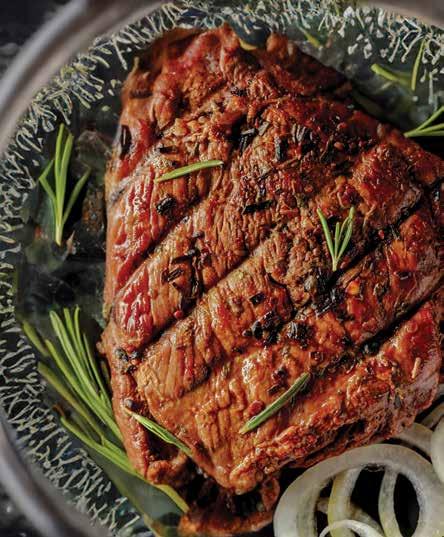
intensive, and it is uncertain whether the results will be positive or not. We do not know if our cells will grow stable in that media or what metabolites are being built up during the process. By developing a computational model specific to cells, we can monitor realtime growth and analyse the results visually," explains Sadanand.
Collaborating with the CMMC on two projects focused on Genome Scale Metabolic Modelling and addressing scalability issues by creating a userfriendly online tool called the Bioreactor Evaluation Toolkit, Sruthi highlights incorporating computational modelling not as a one-size-fits-all solution but as a customizable approach. "If you are facing a media development issue, it is important to invest in a model that is tailored to address that specific issue, such as GEM modelling," she adds.
Educating the consumers and chefs about the technology behind the
production of cultivated meat is the other way out, something that should be an ongoing process. "What better than to actually partner with people who are well-renowned for their delicacies and re-engineer dishes - the chefs. Integrations of whole-cut and minced cultivated meat products can reshape traditional dishes," says Shetty.
There is no silver bullet for scaling cultured meat production from the benchtop scale to commercial quantities. With the industry's unique hurdles, investors may need to think outside the box, and consumers should be open-minded.
Let's face it, sustainability is the name of the game right now. And if space is trying to offer up some solutions, why not see how it all plays out instead of immediately declaring it dead in the water? In the words of Joyce Meyer, "Patience is not simply the ability to waitit's how we behave while we're waiting'.
In the fast-evolving world of the HORECA (Hotel, Restaurant, and Café) sector, menu innovation stands out as a crucial element for success. Chefs play a central role in this innovation, shaping dining experiences and setting trends that cater to diverse tastes and preferences. Nowhere is this more evident than in the dynamic culinary landscape of the Middle East, where a convergence of cultures and flavours is reshaping the region's dining scene.
At the heart of menu innovation in the Middle East is the culinary creativity and fusion showcased by chefs like Aziza at Ugur by Aziza in Jeddah's Al-Nahdah district. Combining Uyghur culinary traditions, originating from the Uyghur ethnic group of Central Asia, with Saudi flavours, Ugur offers a unique dining experience. Signature dishes include Laghman, a noodle dish with stir-fried mutton and vegetables; Samsa, lamb pies; and Polo, a rice dish with mutton, fried onions, and almonds. This fusion cuisine has garnered a significant following in Saudi Arabia, attracting both expatriate communities and locals who appreciate its distinct flavours.
Middle Eastern chefs possess a keen awareness of evolving consumer preferences, notably the surging demand for health-conscious and sustainable dining experiences. Wild and the Moon, nestled in Dubai's culinary landscape, beautifully embodies this ethos. This vibrant cafe offers a delightful array of plant-based, organic, and ethically sourced dishes and beverages, each crafted with meticulous attention

to quality and sustainability. From invigorating cold-pressed juices to nourishing smoothie bowls and fresh salads, every item on their menu reflects a commitment to using locally sourced ingredients whenever feasible. Moreover, Wild and the Moon goes beyond mere culinary offerings; their dedication to sustainability extends to eco-friendly packaging and operational practices, echoing their deep-seated values of environmental stewardship. The chef's menu, thoughtfully curated with the region's health and sustainability consciousness in mind, exemplifies how Middle Eastern culinary artisans are seamlessly integrating consumer trends into innovative dining experiences.
Collaboration among chefs is driving menu innovation in the Middle East, with culinary exchanges and partnerships leading to a fusion of flavours and ideas. Events such as the Dubai Food
Festival serve as platforms for chefs to showcase their skills and introduce new concepts, further enriching the culinary landscape of the region.
Innovative chefs understand that dining is more than just about food; it's about creating memorable experiences. Restaurants like Al Muntaha in Burj Al Arab, under the guidance of Chef Saverio Sbaragli, offer diners an immersive culinary journey that engages all the senses, elevating traditional dishes to new heights of luxury and sophistication.
Sustainability and Ethical Practices
Sustainability is a key focus for chefs in the Middle East, who prioritise locally sourced, organic, and fair-trade ingredients. An emphasis on seasonal produce and sustainable practices at his restaurants reflects a commitment to ethical dining that resonates with consumers and contributes to a more environmentally conscious food industry.
In conclusion, chefs are the driving force behind menu innovation in the HORECA sector, shaping the future of dining in the Middle East and beyond. By embracing culinary creativity, responding to consumer trends, fostering collaboration, enhancing the dining experience, and promoting sustainability, chefs are not only redefining gastronomy but also enriching cultural exchanges and forging connections through the universal language of food. As the Middle East continues to embrace its culinary heritage and attract global talent, the contributions of these chefs will remain indispensable in shaping the region's gastronomic identity.
Abubakari
The key to understanding different cooking methods of meat is to know from which meat cut it is. Meat is the fleshy part of the animal, which is made up of several unique muscles. Parts of animals from which we derive flavour, including the shoulder, neck, leg, brisket, etc, are all more tender and chewable than parts such as rib, loin, etc. The cooking method is directly related to the quality of food, which is why tender meat needs to be cooked slowly at moist and low heat, while less tender meat is cooked at quite a high heat.
Meat animals are most often cut into pieces from large carcasses into what I will describe as secondary and primary cuts. In some cases, primal and sub-primal meat is cooked whole, but for the most part, it is broken down into several different types of more minor portion cuts.
Forequarter cuts, as may be seen from the name, relate to the front side of an animal. It includes cuts such as the shoulder, brisket and chuck.
Hindquarter cuts, on the other hand, are derived from the back part of the animal and include quite familiar parts such as rump, topside and silverside cuts.
Beef is a rich source of protein, Phosphorus, Vitamin B-12, Niacin, Riboflavin and many more. It is an essential meat product whose processing is divided into quarters, the forequarter and hindquarter, between the 12th and 13th ribs. The major wholesale cuts fabricated from the forequarter are the chuck, brisket, foreshank, rib, and short plate. The hindquarter produces the short loin, sirloin, rump, round, and flank.

Understanding the various cuts of beef is relevant to selecting the right meat for your culinary needs.
Forequarter Cuts, as may be seen from the name, relate to the front side of an animal. It includes cuts such as the shoulder, brisket and chuck. They offer a variety of cooking options, from slow cooking to grilling, making them adaptable options for different dish types. Their rich flavour and tenderness make them popular among meat lovers.
1. Chuck: A flavoursome and versatile cut. Makes perfect stews and braised dishes.
2. Brisket: This is tender and wellmarbled. It is usually appropriate for slow cooking methods such as smoking or braising.
3. Short Ribs: This is great for slow
cooking or barbecuing. It is really rich and meaty.
4. Shank: Very distinctive taste and gelatinous. Very common in soups and stews.
5. Chuck Eye Roll: Tender and wellmarbled, suitable for roasting or grilling.
6. Rump: A boneless, flavorful and lean cut that is perfect for grilling or roasting.
Hindquarter Cuts, on the other hand, are derived from the back part of the animal and include quite familiar parts such as rump, topside and silverside cuts. They are the are the bold and beautiful fairies of your plate.
1. Sirloin: Sirloin is located in the lower back region. The cut is wellmarbled and delivers a juicy and flavoursome steak.
2. Rump: This is situated a little above the hind legs. The rump offers a balance of tenderness and excellent flavour.
3. T-Bone: This cut features a T-shaped bone, with one side being the flavoursome sirloin and the other side being the tender fillet steak.
4. Porterhouse: The porterhouse cut offers a larger portion of the tender fillet along with the sirloin, which is quite similar to the T-bone.
5. Tri-Tip: It is a triangular cut that is renowned for its tenderness and robust flavour.
6. Bavette: Has a rough texture and intense flavour. It is perfect for grilling or marinating. This is also known as flank steak.
The next edition will elaborate on Midsection Cuts and Beef Grading.
Senior chefs play a pivotal role in guiding young chefs to become humble leaders, explains Chef Tarek Mouriess
Once upon a time, after I graduated from the Hotel Institute, I had never thought that I would become a kitchen instructor and teach generations of young chefs from diverse cultural backgrounds. However, that era of my life taught me how to effectively bridge the gap between generations when it comes to the common art of cooking and food.
In the ever-evolving culinary industry, the role of seasoned chefs with a wealth of experience cannot be underestimated. These individuals have weathered challenging circumstances throughout their careers, and despite their limited visibility, they possess the potential to mentor, embrace, clarify, and lessen the distance between themselves and the young chefs of today. By understanding the differences between the eras of senior chefs and the current era, we can explore how technology and AI have facilitated learning processes for the new generation. Moreover, it becomes evident that the foundation of cooking, the history behind dishes, and the development of essential culinary skills are crucial aspects of the growth of young chefs.
The Era of Senior Chefs
Seasoned chefs have learned through trial and error, honing their skills and knowledge through hands-on experiences. They faced numerous challenges, pushing the boundaries of their abilities and developing an innate understanding of the culinary craft. This era instilled in these chefs a profound
respect for the foundations of cooking, the history of culinary traditions, and the artistry behind every dish.
Current Era: Technology and AI
With the emergence of artificial intelligence, the culinary landscape has undergone a significant transformation. The new generation of chefs has access to a wealth of information, from online courses and tutorials to recipe databases and virtual cooking assistants. While these resources provide immense learning opportunities, young chefs must recognize the importance of grasping the fundamentals and history of culinary arts. Understanding the why behind techniques and ingredients fosters a deeper connection to the craft and allows for innovation grounded in tradition.
Role of Seasoned Chefs as Mentors
Despite their limited visibility in today's fast-paced culinary world, seasoned chefs possess invaluable wisdom and experiences that can significantly benefit the new generation. By embracing their role as mentors, these seasoned chefs can bridge the gap between themselves and the young chefs, as well as the traditional old-school chefs. Communication and active engagement with young chefs throughout their learning process are vital in cultivating a supportive and collaborative environment.
Power of Storytelling: I love to tell my stories when I start my career …. We all have a wealth of stories and experiences
that can captivate and inspire the new generation. Encourage seasoned chefs to share their journeys, including the hurdles they overcame and lessons they learned along the way. These stories can serve as powerful teaching tools, providing valuable insights and guidance to young chefs.
Embracing Innovation without Neglecting Tradition: While technology and AI have revolutionized the culinary industry, young chefs must balance between embracing innovation and respecting tradition. Seasoned chefs can help young chefs understand the importance of preserving culinary heritage while embracing new techniques to push the boundaries of creativity.
Seasoned chefs can guide young chefs in understanding the importance of the fundamentals of cooking. From baking bread from scratch to perfecting the art of cooking fish and producing fresh sauces, these foundational skills build a solid culinary base. Additionally, imparting knowledge about food sourcing, sustainable practices, and the intricacies of butchery instills a well-rounded understanding of the culinary world.
Alongside technical skills, seasoned chefs can impart essential qualities of humility and leadership to young chefs. Humility fosters an eagerness to learn and grow, while leadership skills

enable young chefs to become future leaders in the industry. By sharing their experiences, seasoned chefs can inspire and guide young chefs on their journey toward becoming not just skilled culinary professionals but also compassionate and inclusive leaders.
Young chefs can develop valuable qualities such as tolerance, resilience, and patience through the guidance of experienced mentors in the culinary industry. Given the demanding and high-pressure nature of this profession, aspiring chefs must possess these attributes in order to overcome obstacles and succeed in their careers. Seasoned chefs can equip their protégés with the necessary tools to thrive by emphasizing the importance of cultivating these qualities.
Creating a Supportive Learning Environment: Mentorship goes beyond imparting knowledge and skills. Seasoned chefs can create a supportive learning environment where young chefs feel comfortable asking questions,
seeking guidance, and expressing their ideas. Encourage seasoned chefs to foster an atmosphere of open communication and respect, where constructive feedback is given with the intention of nurturing growth.
The Value of Collaboration and Networking: Seasoned chefs can introduce young chefs to a broader network of culinary professionals, fostering collaboration and providing opportunities for growth. Encourage seasoned chefs to facilitate connections, organize industry events, or even establish mentorship programs that bring together chefs from different generations.
The culinary landscape is constantly evolving, with new trends, dietary preferences, and cultural influences emerging. Seasoned chefs can guide young chefs in navigating these changes while staying true to their culinary roots. By sharing their experiences of adapting to trends throughout their careers, seasoned chefs can help young chefs embrace innovation without compromising on quality and authenticity.
The Role of Continuous Learning: Emphasize the importance of lifelong learning in the culinary profession. Both seasoned chefs and young chefs can benefit from staying updated on industry developments, attending workshops and conferences, and seeking out new culinary experiences. Encourage seasoned chefs to lead by example and demonstrate their commitment to growth and improvement.
The bond between seasoned chefs and the new generation is a vital component in the growth and development of the culinary industry. By recognizing the value of mentorship, embracing the foundations of cooking, and fostering humility, leadership, and essential qualities, the distance between generations can be bridged.
It is through active communication, listening, sharing different opinions, and a commitment to teaching and learning that the culinary community can thrive and continue to evolve. By extending their legacy to future chefs, seasoned chefs play an integral role in shaping a brighter future.



Soniya Ashar,
Recently, a scandal erupted when several popular Indian spice brands were found to contain harmful ingredients not listed on their labels. Laboratory tests revealed the presence of substances such as artificial colors, unauthorized preservatives, and even hazardous chemicals. This alarming discovery has raised concerns about food safety standards, not only in India but also in the Middle East, where these spices are widely consumed. Unfortunately, this is not an isolated incident. Many harmful ingredients, while listed on product labels, are still flying under the radar of consumers who are unaware of their potential dangers.
Artificial Sweeteners: A Bitter Truth
Artificial sweeteners like aspartame, sucralose, and saccharin are often marketed as healthier alternatives to sugar, especially in a region where diabetes rates are high. However, research has linked aspartame to increased risks of cancer and neurological issues. A 2021 study published in the journal "Nutrients" found that frequent consumption of artificial sweeteners can lead to metabolic disorders and weight gain. Despite being approved by regulatory agencies, the long-term effects of these chemicals remain a concern for many health experts.
Trans Fats: The Silent Killer
Trans fats, found in many processed foods, are notorious for raising bad cholesterol levels and lowering good cholesterol, significantly increasing the risk of heart disease. According to the World Health Organization, eliminating trans fats from the diet could prevent thousands of heart attacks and deaths each year. While some Middle Eastern countries have begun to regulate trans fats, they are still present in many imported and locally produced foods. Always check

labels for "partially hydrogenated oils" to avoid this harmful ingredient.
Monosodium Glutamate (MSG): Flavor Enhancer with a Downside
Monosodium glutamate (MSG) is used to enhance flavor but has been reported to cause headaches, nausea, and other adverse reactions in some individuals. This phenomenon, often referred to as "Chinese Restaurant Syndrome," is supported by numerous anecdotal reports. While not everyone is sensitive to MSG, those who are may experience uncomfortable symptoms. Moderation and awareness are key when consuming foods that contain this additive, especially in a region where MSG is commonly used in many processed and restaurant foods.
Food dyes such as Red 40, Yellow 5, and Blue 1 are used to make products more visually appealing but have been linked to hyperactivity in children and potential carcinogenic effects. A 2018 review in the journal "Environmental Health" highlighted concerns over the safety of synthetic food dyes, citing studies that connect them to behavioral issues in
children. Some countries have imposed stricter regulations or bans on certain dyes, urging a reevaluation of their widespread use in the Middle East.
While it's true that many additives are approved by regulatory agencies, growing research suggests that the longterm effects of these substances may not be fully understood. Furthermore, industry-funded studies often show a bias toward safety. It's important to recognize the difference between regulatory approval and actual safety, especially when new, independent research surfaces.
In a world where convenience often trumps health, it's crucial to stay informed about what we put into our bodies. By choosing natural, whole foods and pushing for more transparent labeling, we can protect our health and the well-being of future generations. Now that consumers are becoming more aware of these issues, it's a great opportunity for food and beverage brands to create clean, transparent products. Next time you shop, take a moment to read labels and understand the ingredients. Your body will thank you.
After reading the ingredient list on the back of food packages, avoid products containing the following:
Artificial Sweeteners: Aspartame, Sucralose, Saccharin
Trans Fats: Partially hydrogenated oils
Monosodium Glutamate (MSG)
Artificial Food Dyes: Red 40, Yellow 5, Blue 1
By making informed choices and advocating for safer food practices, we can mitigate the risks posed by these hidden dangers and lead healthier lives in the Middle East.
(Part Three)
Chef
Dear Chefs,
In our previous articles, we delved into the intricate realm of food waste, exploring its multifaceted nature and the drivers that contribute to its generation within the hospitality sector. Now, it's time to shift our focus towards practical solutions and best practices that can pave the way for sustainable food waste management (SFWM) in this dynamic industry.
The hospitality sector, encompassing hotels, restaurants, and catering services, plays a pivotal role in addressing the global food waste challenge. By embracing innovative strategies and adopting a proactive approach, we can collectively minimize the environmental impact of our operations while maximizing resource efficiency and promoting a more sustainable future.
Effective food waste management begins with responsible procurement practices. Establishing strong partnerships with local suppliers and prioritizing the sourcing of seasonal, locally grown produce can significantly reduce transportation-related waste and carbon emissions (Filimonau et al., 2019). Embracing the "farm-totable" concept, which involves sourcing ingredients directly from local farms and producers, can further minimize waste and support sustainable agriculture practices.
Additionally, implementing robust

inventory management systems and adopting just-in-time delivery models can help minimize excess stock and prevent spoilage (Pirani & Arafat, 2016).
A notable trend in the food services sector is the utilization of pre-cleaned or pre-cut vegetables. By ordering pre-diced pumpkins, pre-sliced onions, and other pre-prepared ingredients for cooking operations, culinary establishments can significantly reduce the generation of peels, offcuts, and preparation waste. This approach not only minimizes waste but also offers the added benefit of labour cost savings, making it particularly suitable for operations where labour expenses are a significant consideration.
Careful menu planning and portion control are essential components of a comprehensive food waste management strategy. Implementing standardized recipes and portion sizes can help minimize overproduction and ensure consistency in service (Papargyropoulou et al., 2016). Encouraging the use of root-to-stem cooking techniques and
incorporating often-discarded parts of vegetables and fruits into creative dishes can significantly reduce preparation waste (Filimonau & Sulyok, 2021). Furthermore, offering smaller portion sizes or half-portions can cater to diverse appetites and preferences, reducing the likelihood of plate waste. Engaging guests in the fight against food waste through clear communication and educational materials about portion sizes, dog bag options, and the environmental impact of food waste can empower them to make more informed and sustainable choices (Juvan et al., 2017).
Fostering a culture of sustainability within the hospitality sector requires active engagement and education of guests. Providing clear information about the establishment's food waste reduction efforts, such as composting programs or partnerships with local food banks, can raise awareness and encourage guests to participate in these initiatives. Additionally, offering incentives or discounts for guests who choose smaller portions or opt for doggy bags can promote mindful consumption and reduce plate waste. Engaging guests through interactive displays, workshops, or educational materials can further enhance their understanding of the environmental impact of food waste and inspire them to adopt more sustainable practices (Wang et al., 2021).
In Australia, many food operations partner with local food banks, such as Oz Harvest and Second Bite, or
June-July 2024 Gulf Gourmet
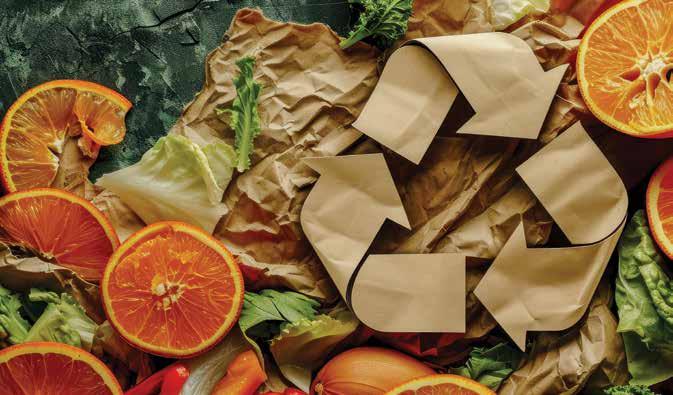
other charitable organizations. This collaboration provides a valuable avenue for repurposing surplus food or buffet leftovers that are still safe for consumption. Establishing clear guidelines and procedures for food donation can help overcome potential concerns about liability or food safety standards (Filimonau & Tochukwu, 2020).
In New York, USA, innovative mobile applications like "Too Good To Go" and "Flashfood" have emerged as platforms for hospitality businesses to resell surplus food or unsold items at discounted prices to consumers (The New York Times, 2022). These apps not only reduce food waste but also provide an additional revenue stream for businesses while offering affordable options for customers.
Such food charity organizations and
innovative apps can help reuse and redistribute surplus food, preventing it from being buried underground and going to waste.
Establishing a robust waste segregation system is crucial for effective food waste management. Providing clearly labelled bins for different waste streams, such as food waste, recyclables, and general waste, can facilitate proper sorting and ensure that food waste is diverted from landfills (Mak et al., 2021). Engaging and educating staff on the importance of proper waste segregation can further enhance the effectiveness of this practice.
On-site composting or worm farming can be an excellent solution for hospitality establishments to recycle their food
waste. Composting not only diverts organic waste from landfills but also produces nutrient-rich soil amendments that can be used for landscaping or donated to local community gardens (Pirani & Arafat, 2015). Worm farming, or vermicomposting, is another eco-friendly option that utilizes worms to break down food waste, producing valuable compost and liquid fertilizer.
By embracing these best practices and fostering a culture of sustainability within the hospitality sector, we can collectively contribute to the global effort of reducing food waste and its associated environmental impacts. Remember, every small step counts, and together, we can create a more sustainable and responsible future for our industry and the planet we call home.
Chef Carl, from Sydney
Reference:
Filimonau, V., Toduna, C., Mika, M., Ipate, I., & Gheorghe, G. (2019). Circular economy with zero waste? Exploring opportunities and barriers for the waste trade in the UK. Circular Economy and Sustainability, 1-26.
Filimonau, V., & Sulyok, J. (2021). Food waste management in hospitality operations: A critical review. Tourism Management, 85, 104341.
Filimonau, V., & Tochukwu, P. (2020). Exploring food waste management in the UK hospitality industry: A choice experiment approach. Journal of Cleaner Production, 272, 122686.
Juvan, E., Grün, B., & Dolnicar, S. (2017). Drivers of plate waste at two types of hospitality events. Journal of Hospitality Marketing & Management, 26(7), 723-743.
Mak, T. M., Chin, W. L., Lim, P. N., & Tsagkari, M. (2021). Drivers of food waste generation in Malaysian hotel sector: A preliminary study. Environmental Science and Pollution Research, 28(7), 8021-8032.
Papargyropoulou, E., Lozano, R. K., Steinberger, J., Wright, N., & Ujang, Z. B. (2016). Food waste prevention in Malaysian hotels: a risk mitigation strategy. Journal of Environmental Management & Tourism, 7(4), 629-642.
Pirani, S. I., & Arafat, H. A. (2016). Solid waste management in the hospitality industry: A review. Journal of Environmental Management, 169, 320-336. The New York Times. (2022, September 20). Food Waste Apps Take a Bite Out of What's Being Tossed. https://www.nytimes.com/2022/09/20/climate/food-waste-app.html Wang, LE, Xue, L, Ruan, WQ, Liu, XL, & Cheng, JQ, (2021), Factors influencing plate waste at hotel buffet restaurants in Beijing, China. Resources, Conservation and Recycling, 164, 105177.
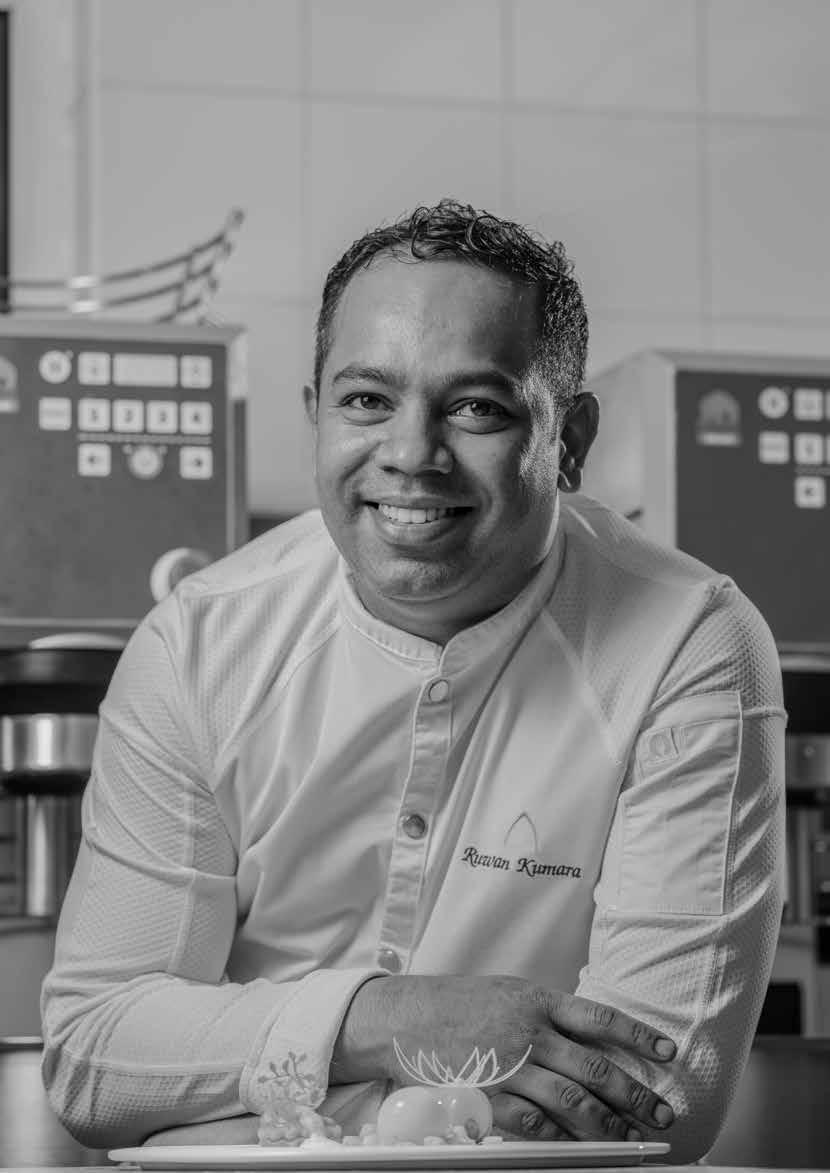
Chef Ruwan Kumara is bringing citrusy
When life hands him lime, he doesn't just settle for margaritas; Chef Ruwan Kumara takes the proverbial stance a step further to explore the entire zestacular citrus family!
Do you think a dessert is incomplete without citrus?
"A dessert is best with citrus," claims Chef Ruwan Kumara, the Pastry Chef at The Palace Downtown Hotel.
No doubt, his impulse gravitates towards the canon of citrus varieties, encompassing lemon, calamansi, grapefruit, yuzu, and blood orange, as he divulges his preferred ingredients. "I am particularly drawn to anything citrus," he reveals. "When developing a new dish, try to have a tangy element. Without the presence of citrus fruits, I believe that the end result could lack the dish quality."
For the Alra Pro Pastry Mastery Competition, he expressed his signature citrus flair by creating a deconstructed cheesecake paired with citrus crumble infused with lemon and orange zest, complemented by a fruity mango confit. "I also have included the warm almond citrus pudding, which is a comforting element with its zesty orange and some candied lemon for added sweetness. On the chilled side, a cheese lemon sorbet made with Arla Pro cream cheese (34%) offers a refreshing contrast. And there is fresh mango vanilla compote and compressed sablé to complete this dessert. "
He is familiar with the ins and outs

The first thing I learnt was the particular pastry techniques from each chef, and the second, dealing with high-pressure situations with grace
of pastry trends, staying ahead with seasonal ingredients and catering to what the client wants. "I get the ideas through analyzing menu, recipes, products, and emerging food trends, and I am trying to do everything on my end to what you call it now: satisfy the guest," he explains earnestly.
As ingenious as he is with his culinary ideas and modern presentation, such as his competition dish featuring roulade and mango gel, he applies an equivalent metric of expertise when managing his team of nine staff in the pastry department.
Situated in convenient proximity to renowned landmarks such as Dubai Mall and Burj Khalifa, the Palace Downtown Hotel features an array of dining options, including Al Bayt, Buhayra Lounge, Ewaan, and Thiptara. It is here, in the thick mist of aprons against a backdrop of pastry sheeters, ovens, moulds, and bench scrappers, that one can find Chef Ruwan overseeing the execution of all the delectable pastry and baked goods at the luxurious 184-room hotel.
"I am responsible for preparing the dish, arranging food, conducting food testing, and creating menus under the guidance
of Cluster Pastry Chef Abel Vieilleville and Executive Sous Chef Sourav Chatterjee. Our team collaborates on all tasks, testing the ideas and perfecting our menu ideas before finalizing them," explains the 36-year-old chef.
The central province of Sri Lanka is home to a city known for its rich historical significance, having served as the former capital of ancient kings, for its pilgrimage site - the revered Temple of the Tooth relic, hosting the vibrant festival of Esala Perahera, and for presenting traditional dishes like sour fish curry, Ambul Thiyal.
Chef Ruwan's connection with the Buddha Tooth relic temple is a close one, rooted in his upbringing in Kandy. He frequented the Temple with his family since he was knee-high to a grasshopper. The hopefulness and calmness he found in the temple visits were only understood when his childhood dreams of becoming an artist were thwarted, leading him to find his calm in chaos by taking a shot at pastry-making.
"After finishing his school, I completed a one-year hotel course diploma and began my career in 2007 at a fourstar hotel, The Palms," he says. A few promotions and close to four years he came to Dubai to join the Hues Boutique Hotel as a commis. A year later, he applied for a job, underwent trials, and was hired at his breakthrough place - the
If you are not interested in learning something, then you can't survive. Then, follow the recipes. If you do that, you can be a good chef in the future
Emirates Palace Hotel in Abu Dhabi.
Starting as a Demi Chef de Partie there, he learnt about the a la carte menus through chefs from all corners of the globe - Germany, Australia, and the UK. "The first thing I learnt was the particular pastry techniques from each chef, and the second, dealing with high-pressure situations with grace," he reflects on the proud moment of working in one of the top hotels in UAE.
In 2014, he returned to Dubai again to work for a semi-government catering company before landing a position at the Palace Downtown Hotel. This pivotal period in his career instilled selfassurance in him, and he rose through the ranks to become a Pastry Sous Chef. As time went on, he really found his unique culinary technique and style.
Having notched up both knowledge and skills in his long career, Chef Ruwan was ready to put down roots in Sri Lanka with the role of Executive Pastry Chef at the Mahaweli Reach Hotel in Kandy, but unfortunately, his stint there was a flash in the pan.
"I worked around one and a half years, but my plans took an unexpected turn due to the pandemic, and the opportunity to work as a Pastry Chef at the Palace Downtown became a hopeful prospect."
His happy family consists of his wife, Prashani Nanayakkara, and their threeand-a-half-year-old twins, Anuthmi Tehanya and Aken Mandinu, who keep him grounded, deflating the daunting tasks at hand. At home, he shares his wife as she manages the kitchen operations. She cooks for the family to keep the balance, and when he has time, he sneaks in to sprinkle his pastry prowess in the form of homemade cakes and cookies.
Chef Ruwan has his advice for young chefs outlined: Stay curious and always be open to learning new trends in the industry.
"Today, in every moment, we come across new recipes. Stay updated on the industry and have a good attitude to learn to keep it simple and relevant. He adds, "If you are not interested in learning something, then you can't survive. Then, follow the recipes. If you do that, you can be a good chef in the future."
Mix the cream and custard with vanilla beans and then add the gelatin.
Keep it inside the chiller for half an hour

Pectin NH
Mix the cream and custard with vanilla beans and then add the gelatin.
Keep it inside the chiller for half an hour
WARM ALMOND CITRUS PUDDING
SOAKING SYRUP FOR PUDDING
MANGO VANILLA COMPORT
Mix the cream and custard with vanilla beans and then add the gelatin.
Keep it inside the chiller for half an hour
Mix the cream and custard with vanilla beans and then add the gelatin.
Keep it inside the chiller for half an hour
CHEESE LEMON SORBET
Mix the cream and custard with vanilla beans and then add the gelatin.
Keep it inside the chiller for half an hour
Mix the cream and custard with vanilla beans and then add the gelatin.
Keep it inside the chiller for half an hour
COMPRESSED SABLE
Mix the cream and custard with vanilla beans and then add the gelatin.
Keep it inside the chiller for half an hour
Italian cuisine may be the basis of Chef Lorenzo Buccarini's cooking style, but he connects the dots of techniques and flavours from cultures like Asian, Moroccan, and Mediterranean cohesively
Dining in the digital age is about endless innovative possibilities. Among many in the industry who are tapping this trend is an establishment in Dubai, bold enough to join the movement of blending technology, artistic expression, and gastronomy.
Gulf Gourmet's curious quest about the world where entertainment, AI-generated art installations, and Mediterranean-Asian fusion meet led us to Lorenzo Buccarini, the Executive Chef at Zenon Dubai.
Chef Lorenzo's lifelong passion has been the culinary world. It was cultivated from his early days in his family's kitchen and honed through years of professional experience worldwide. His journey has taken him from a young cook in Italy to various kitchens around the world, each experience enriching his culinary perspective. In Dubai, he has embraced diverse culinary influences, allowing him to create innovative dishes that blend tradition with modernity.
Could you tell us about your childhood and your family?
I grew up in a family where the kitchen was the heart of our home. My fondest memories are of helping my grandmother prepare traditional dishes, especially during holidays. These early experiences ignited my passion for
I grew up in a family where the kitchen was the heart of our home
cooking and shaped my culinary journey.
Why did you choose to become a chef? Did you study/intern for it? What inspired you to pursue a career in the culinary arts, mainly specializing in Italian cuisine?
My passion for cooking began at a young age, inspired by the vibrant sights and smells of my family's kitchen. Helping my grandmother prepare "lasagne al forno" during the holidays was a defining moment. I pursued formal training and embarked on my professional journey, with a significant milestone being my time at LPM in London.
Can you share a memorable kitchen moment or dish that holds a special place in your heart from your time at La Mamounia Hotel in Marrakech?
One memorable moment at La Mamounia was creating a unique fusion dish that combined Moroccan and
Italian flavors. It was a lamb tagine with an Italian twist, which received rave reviews and remains one of my favorite culinary creations.
Over the years in the F&B industry, what are your thoughts on the unique concepts behind a restaurant's success in Dubai? Dubai's culinary scene is dynamic and diverse. Success here hinges on innovation, quality, and a deep understanding of the local and international palate. It's about creating a memorable dining experience that resonates with guests.
With your extensive experience in various countries, which culinary destination has left the biggest impression on you, and why? Italy remains the most impactful culinary destination for me. Its culinary heritage and emphasis on fresh, highquality ingredients have profoundly influenced my cooking style.
As an Executive Chef at Zenon, how do you balance tradition and innovation in your culinary creations?
At Zenon, I strive to honor traditional flavors while incorporating modern techniques and presentations. This balance allows us to offer a unique dining experience that respects culinary heritage while embracing contemporary trends.
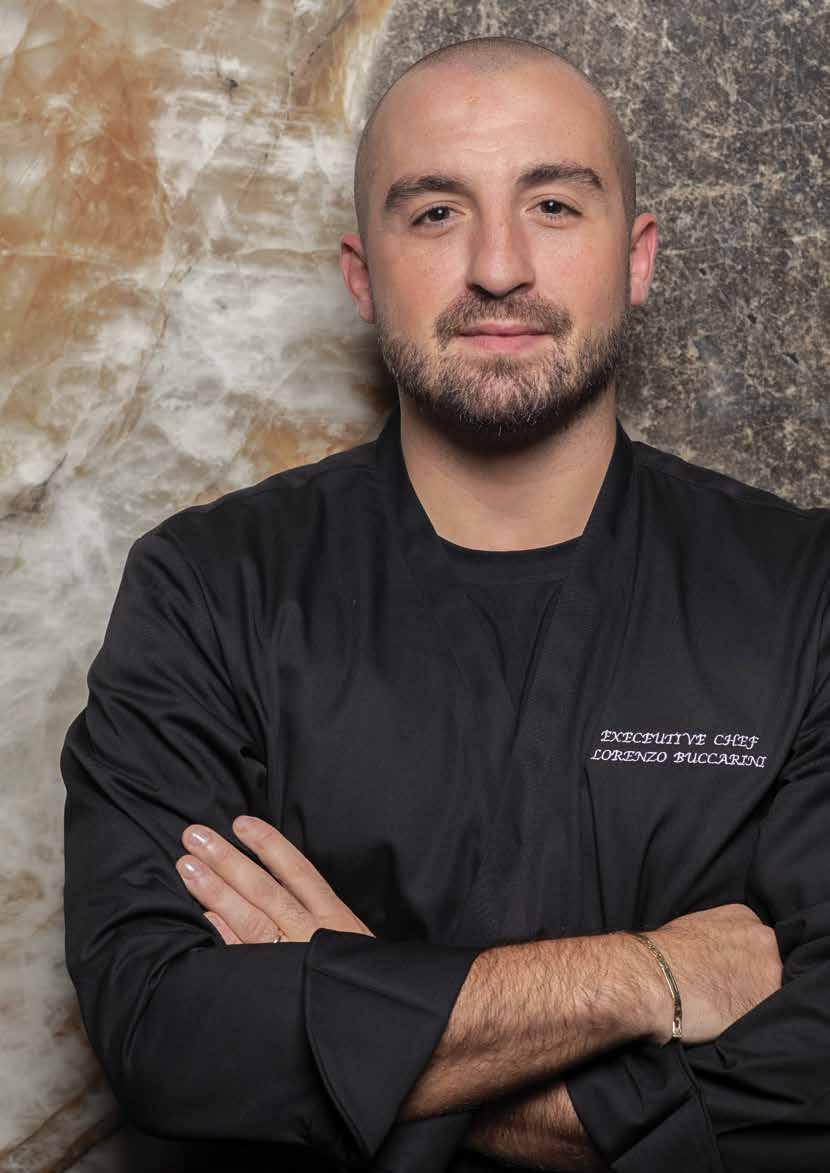
Your menu at Zenon features a fusion of Mediterranean and Asian flavors. What inspired this unique culinary approach, and what are some signature dishes we can expect to enjoy?
The fusion of Mediterranean and Asian flavors at Zenon is inspired by my travels and the diverse culinary landscape of Dubai. Signature dishes include our Tuna Tataki with a Mediterranean twist and a Mediterranean seafood paella infused with Asian spices.
How do you incorporate advanced technology into the dining experience at Zenon, and what impact does it have on the overall guest experience?
We use advanced technology to enhance both the preparation and presentation of our dishes. From precision cooking techniques to interactive dining elements, technology helps us create an immersive and memorable dining experience.
What do you enjoy most about being a chef, and what keeps you motivated to push the boundaries of gastronomy continually?
I love the creativity and the joy of seeing guests enjoy my creations. The endless possibilities in the culinary world keep me motivated to innovate and push the boundaries of gastronomy.
Can you share some behind-thescenes insights into the process of developing and curating the menu at Zenon, from concept to execution?
The menu development at Zenon is a collaborative process. It starts with conceptualizing dishes that align with our culinary vision, followed by rigorous testing and refinement to ensure each dish meets our high standards of flavor and presentation.
Zenon is a blend of luxury and forward-looking technology. What do you hope guests take away from their dining experience?
I hope guests leave Zenon with a
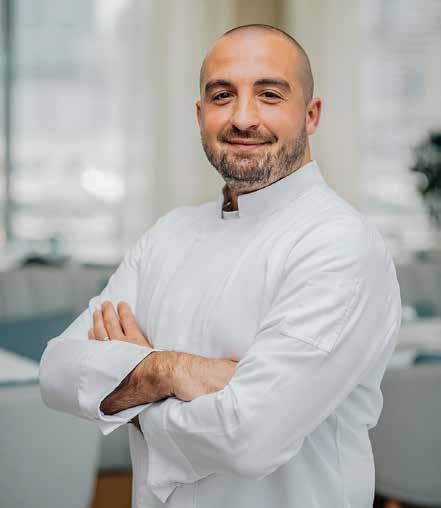
Could you share your creative process for menu planning and recipe design? How do you keep your culinary creations fresh and innovative?
I love the creativity and the joy of seeing guests enjoy my creations
sense of awe and satisfaction, having experienced a unique blend of traditional and innovative flavors in a luxurious and technologically advanced setting.
Could you highlight some key influences and inspirations from different cuisines or techniques that you have incorporated into your cooking style?
Italian cuisine forms the foundation of my cooking style, but I've incorporated techniques and flavors from Asian, Moroccan, and Mediterranean cuisines. This blend creates a diverse and rich culinary palette in my dishes.
My creative process involves continuous exploration and experimentation. I draw inspiration from seasonal ingredients, global culinary trends, and feedback from my team and guests to keep our menu fresh and innovative.
What is your advice to young chefs? Invest in quality ingredients, and don't be afraid to experiment—master fundamental cooking techniques, as they are the foundation of any great dish. Stay curious and continuously seek to learn and improve.
What are your future plans?
I plan to continue exploring new culinary frontiers and expanding the horizons of my culinary expertise. My goal is to keep pushing the boundaries of innovation and remaining true to the essence of traditional flavors.
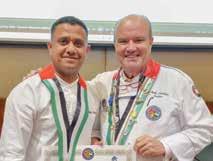

The June-July Guild meeting was hosted at the Radisson Blu Hotel, Yas Island, Abu Dhabi, on May 13, 2024. We thank Chef Chamil Sanjeewa, and his team for hosting the meeting. Here are the images from the meeting

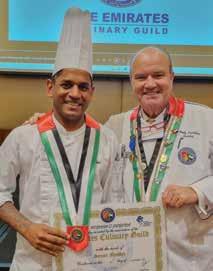
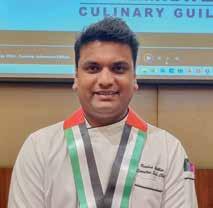
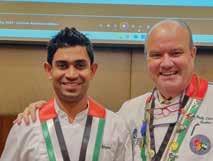
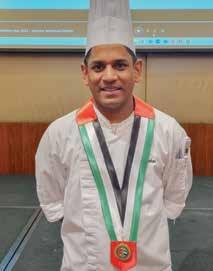
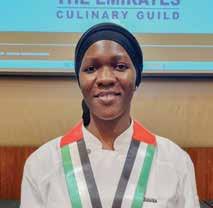
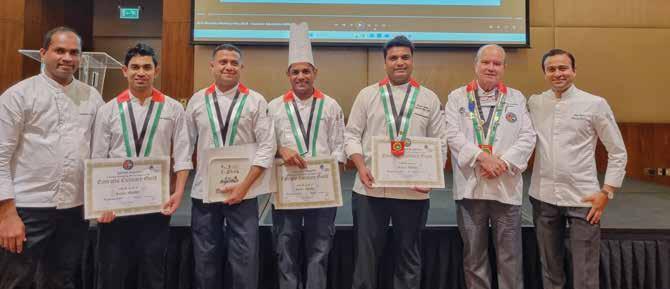
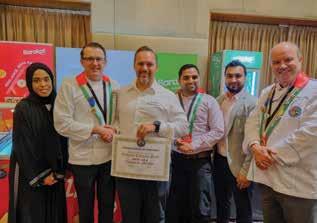
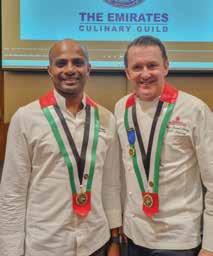
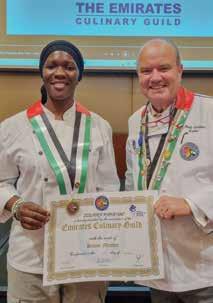
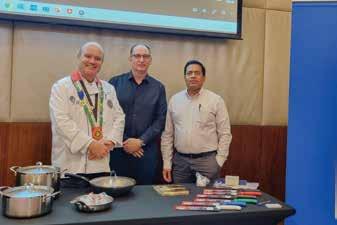

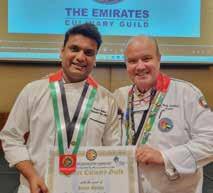
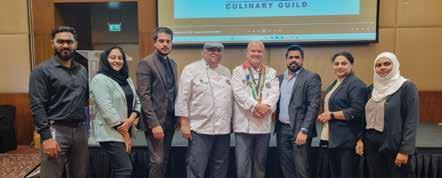
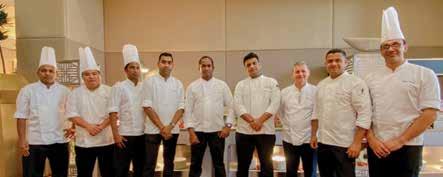

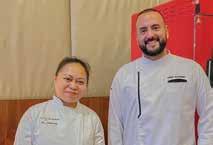
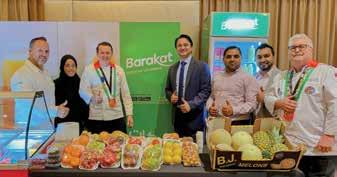
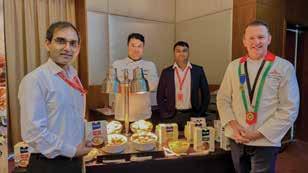

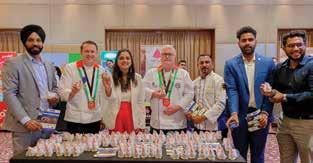
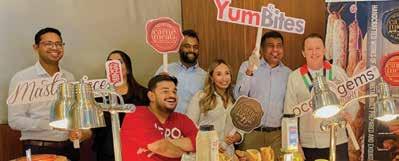



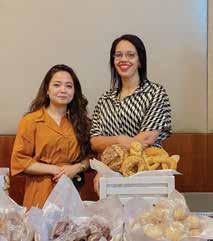
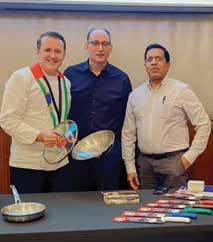
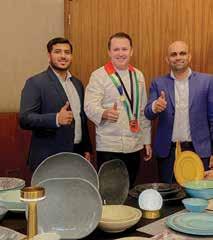

Chef Ponraj Daniel hankers for keeping it 'healthy' in both his venture and guild competitions &
Food and health have always been in tandem. As the demand for nutritious yet delicious meals has increased, the 39-year-old Chef Ponraj Daniel is doing his part through his culinary venture specializing in gourmet meal preparation.
As a co-founder at Meal Plan, a healthy meal plan company with a team of 60 chefs on board, they have scaled to serve over 2,500 clients. "It was an idea devised during the pandemic that has churned into producing 4,000 meals per day," he says.
Taking cues from his decade and a half of culinary repertoire, Chef Ponraj was quick to pinpoint the market's lacuna for delectable yet economical meal solutions that tickle the palates. With the concept, all that remained was to recreate mundane meal plans into nutritious ones.
"We aim to elevate each meal to a gourmet experience that is also clean and healthy. Our dishes are wellbalanced, bursting with flavours from India, Asia, and even the Mediterranean."
Amongst the discourse surrounding the issue of unhealthy food and incentives for healthy choices, Meal Plan’s strategy to offer nutritious meals at competitive prices stands out as a cut in the heavily saturated market. This also contributed to their ability to catch up with the volume of customers. "But when you want to make it affordable, it's quite risky. Of course, the logistics and delivery parts will take a piece of it. A lot of efforts have been put into R&D to make it a cost-effective process in business," he explains.
Beyond Chef Ponraj's math of ingredients at Meal Plan, his business acumen gives us a sneak peek into his technological prowess. According to Chef Ponraj, Meal Plan is also a foodtech company that has incorporated data to streamline the process without losing control over the operation when
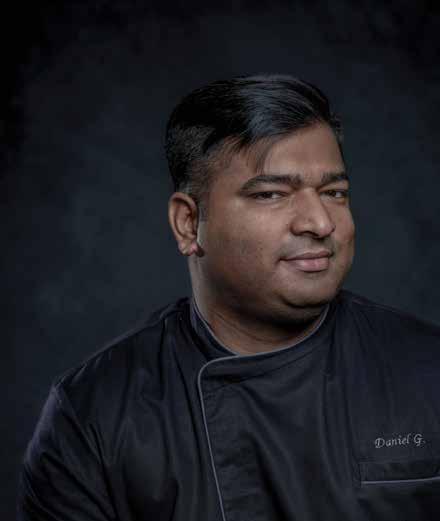
Our dishes are wellbalanced, bursting with flavours from India, Asia, and even the Mediterranean
it expands. "We are building our own applications from time to time, taking account of different stakeholders, whether it be stewards, chefs, or consumers. Providing more information to the system leads to better results. Our integration covers everything from plating to spot checks at different stages, giving us control over how the chef prepares the food, a rarity in smaller operations."
The invocation of technology is also leveraged to cut down on food waste.
Coming from a humble farming background, Chef Ponraj is not an outlier in understanding the value of food. Every menu design he creates makes the most use of the ingredients, which seems a throwback to the organic abundance of Chef Ponraj's hometown, Sengottai, where agriculture thrives as a primary industry. Located in the Tenkasi district of Tamil Nadu, his hometown often hits local headlines for the cultivation of rice, mangoes, coconuts, and tapioca trees.
"At a very young age, I grasped the farm-to-table concept. Therefore, hotel management was a natural choice," he says, fondly remembering his decision to enrol at the Annai Fathima Institute for a Diploma in Hotel Management and Catering Technology. Through his culinary training, Chef Ponraj's inherent introversion began to crumble, replaced by a newfound confidence that bagged him a campus placement at the Taj Coromandel in Chennai. In his two-year tenure, he pulled out all the stops to cross-train, clocking in the morning,
burning the midnight oil with tasks like vegetable carvings and setting up buffets, ultimately climbing the ranks to become a chef de partie.
The year 2008 saw the arrival of his first overseas position with the Jumeirah Group. Following an intensive oneand-a-half-year training regimen and fine-tuning his basics in both fine dining and the central kitchen, Chef Ponraj set out on an adventure to work for the property's multiple establishments.
"Over the years, I worked at the La Parilla restaurant and later at Madinat Jumeirah Resort, handling Pierchic and Segreto. I was part of a team where every member was young and hungry to do something better. We shared knowledge and ideas on emerging trends. Whenever an event or competition took place, we often filled entire buses with enthusiastic participants. Looking back, those nine
I am a keen observer of the ever-evolving restaurant landscape. If you are working for a restaurant, you have to be a learner and a listener
years were truly rewarding," he reminisces.
By the end of 2015, Chef Ponraj joined the main kitchen of Anantara The Palm. As the outlet chef, he had his hands full, overseeing the operations of five outlets that served more than 1000 covers a day. Being a pressure taker,
however, has become synonymous with his reputation in the industry. Chef Ponraj is known for turning tough jobs into a piece of cake, adeptly assembling and training his team to operate with precision and cohesion.
The next two years went into making sure everyday operations went without a hitch. However, his life took a curious turn when he had the chance to give voice to his long-standing passion for restaurants. "I am a keen observer of the ever-evolving restaurant landscape. If you are working for a restaurant, you have to be a learner and a listener. That's what I learned when I worked for Bazar, an outlet in DIFC," he notes.
After a short period, he came across his near-perfect start for healthoriented concepts. Working at the central kitchen of Pret to Go outlets, a nutritious grab-and-go option that used
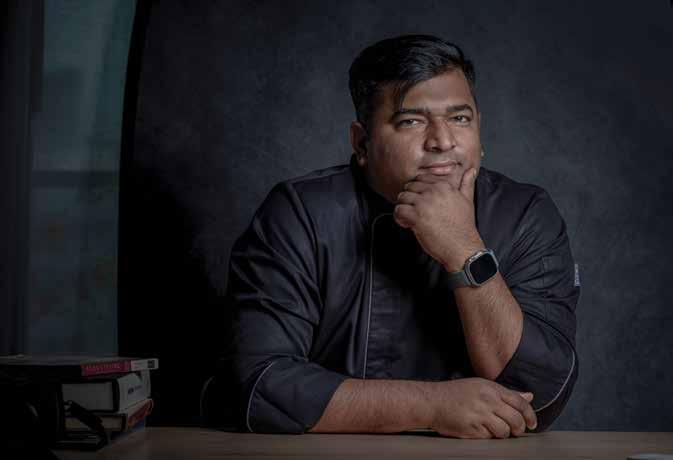
Our integration covers everything from plating to spot checks at different stages, giving us control over how the chef prepares the food, a rarity in smaller operations
wholesome, clean ingredients, nudged him towards materializing his idea of a healthy meal venture.
His initial affair with entrepreneurship ran its course when he unveiled 'As You Fish,' a semi-finding restaurant featuring seafood. Despite the skyrocketing rental charges and expenses that caused the restaurant to shutter its doors, he still holds onto the experience as a learning curve—just a drop in the ocean of challenges that lay ahead on his entrepreneurial journey.
In the following years, he wove his way through Bystro Group, spearheading the launch of its restaurant outlets in Sharjah with a team of 27 chefs. In 2018, an Executive Chef position awaited him at Peninsula Hospitality. "I ran the two upscale concepts, Rodeo Drive and Stables, revamping the menus by introducing fresh ingredients and promoting a health-conscious dining experience. From there, the very creative journey eventually took me to Meal Plan," he explains about the brief time between switching roles.
Meal Plan is a venture that requires a significant commitment of time, trust, effort, and financial resources, he asserts, conveying that the first six months were particularly tricky as they navigated the retail sector by supplying to Spinneys and Carrefour while also managing
online orders. "I used to do 15 deliveries myself in the early stages. From design to delivery, we handled everything in a team of three," he confesses.
Anticipating future growth, they have even diversified their delivery channel through third-party services. Dabbling in three different channels, one might wonder how they keep all the plates spinning. "The motive is to evaluate what works best for the company. This would help us put an end-to-end structure in place and refine the approach," he answers.
Chef Ponraj feels blessed to have a supportive family that includes his two children and wife, who works as a quality controller in the F&B sector and understands the demanding dynamics of the industry. From an afterthought about healthy cooking, Chef Ponraj came up with five vertices focused on
health. From probiotics, keto, balanced meal portions, and snacks to Indofusion cuisine with ingredients rich in antioxidants and medicinal properties, each would focus on a different aspect of nutrition.
"Food is medicine. Whatever you receive is quite far from the freshest. Because it has to be prepared quite early to dispatch you on time. So, I am working on a project to control the time and provide fresh and quality food in GCC," he shares about his personal venture.
It takes a dynamic curve to transition from an unhealthy meal plan to a healthy one.
With Chef Ponraj's commitment to making nutritious food more readily available, a new dawn appears to be approaching.
June-July 2024 Gulf Gourmet

Aalst Chocolate - A Cargill Company
Daniele Masini, Business Development Manager G&D- IMEA, Mob: +971 54 799 2130, daniele_masini@cargill.com, www.aalstchocolate.com
Abu Dhabi Farmers’ Services Centre
Martin Aguirre, Commercial & Operations Director
P.O. Box 62532, Abu Dhabi, UAE Direct Line: +971 2 813 8400. Phone: +971 2 813 8888, Fax: +971 2 813 9999 Mobile:+971 56 685 4836
Agthia Consumer Business Division
Dinusha Gamage, Brand Manager - Food category
Consumer Business Division
Agthia Group PJSC, P.O Box 37725, Abu Dhabi. dinusha.gamage@agthia.com, www.agthia.com
Al Islami Foods
Rasheed Chirakkal, Area Sales Manager- Food Service, Mob: +971 50 5188 391, Off: +971 4 8853 333, rasheed.chirakkal@alislamifoods.com, www.alislamifoods.com
Al Kabeer
Chandan Chakravarty, Research & Development Chef Mob: +971 56 6616 864, Off: +971 6 5333 999 chandan@al-kabeer.com, www.al-kabeer.com
Al Maya Hospitality
Mohamad Hajj Ali, Sales Manager Mob: +971 50 1550998, Off: +971 4 3473500 Email: mohamadh@almaya.ae, www.almaya.ae
Alto Shaam, Inc
Gabriel Estrella Talentti, Director of Sales, Tel: +971 4 321 9712, Mob: + 971 50 8531 707 gabriele@alto-shaam.com, www.alto-shaam.com
Americana Foods
Laurent Stevenart, Plant Based Food Director, Mob: +971 52 1354 732, lstevenart@americana-food.com, www.americanafoods.com
Arab Marketing and Finance, Inc. (AMFI)
Simon Bakht Tel: +961-1-740378 / 741223 / 751262 Email: SBakht@amfime.com
Arabian American Technology (ARAMTEC)
Edgard Chalhoub, General Manager, Tel: +971 4 380 8444, Mobile: +971 50 597 9516, edgard@aramtec.com, www.aramtec.com
Arla Foods
Marc Hayes, Application Manager - MENA, Tel: +971 6 534 6767, Mob: +971 56 417 3310 marc.hayes@arlafoods.com, www.ArlaPro.com, www.arlafoods.com
Bakemart FZ LLC
Syed Masood, Director of Sales Mob : +971 55 609 7526, Tel: +971 4 56708 masood@bakemart.ae, www.bakemart.ae
Barakat Group of Company
Kenneth D’Costa, Managing Director Neil Ranasinghe, Head Culinary Innovation Tel: +971 4 8802121
Barilla Middle East FZE
Duygu Ozpaksoy, Food Services Sales Manager, Tel: +971 4 882 0488, Mob: +971 56 933 0909 duygu.ozpaksoy@barilla.com, www.barillagroup.com
Bayara - Gyma Food Industries
Yassine EL Allam, Key Account Manager, Tel: +971 4 8857 478, Mob: +971 56 2448 259 yassinea@savola.com, www.bayara.com
Del Monte Foods (U.A.E) FZE
Hany Shamseldeen, Mob +971 50 146 7400, hali@freshdelmonte.com, https://me.freshdelmonte.com/
Diamond Meat Processing Co.L.L.C
Kamparath Suresh, Assistant General Manager Business Development, Mob: +971 50 655 4768 wnedal@siniorafood.com, www.almasadubai.com
Dilmah Tea Vivette, Mob +971 508181164, vivettea@dilmahtea.com
dmg events
Hassan Tel: +971 4 4380355, Mob: +971 56 8360993 aysehassan@dmgeventsme.com, www.thehotelshow.com
Emirates Snack Foods
Marwan Husseini / Feda Saimua, Horeca Division Head / General Manager Tel: +971 4 285 5645, Mob: +971 56 526 7181 marwan.husseini@esf-uae.com, www.esf-uae.com
Essity Hygiene and Health AB
Lara Haddad, Customer Marketing Manager - MEIA, Mob: +971 5 276 3887 tork.meia@essity.com, www.torkmeia.com
Faisal Al Nusif Trading Co. L.L.C
Thomas Das, Managing Director Tel: 04 3391149, thomasdas@fantco.net, Web: www.fantco.net
Farm Fresh
Feeroz Hasan, Business Development Manager
Al Quoz, P.O Box 118351, Dubai, UAE Office No : +971 4 3397279 Ext: 253 Fax: +971 4 3397262, Mob: +971 56 1750883
German Icecream Factory
Boris Mueller, Mob: +971 50 108 9030 boris@drmuellers1969.com www.drmuellers1969.com
Greenhouse Foodstuff Trading
Edgard Abounader, UAE Sales Manager – HORECA, Tel: +971 4 8170000, Mob: +971 56 442 4608, Edgard.Abounader@greenhouseuae.com, www.greenhouseuae.com
Ginox Swiss Kitchen
Tiziana Ricottone, Personal Assistant & Communications Manager, Mob: +971 50 5091 689, tiziana.ricottone@ginoxgroup.com, www.ginoxgroup.com
Golden Dunes General Trading LLC
Sulemana, Head Of Sales, Mob: +971 50 125 01 376, sulemana@golden-dunes.com, www.golden-dunes.com
Hamid and Kumar Enterprises LLC
Sunil Ahluwalia, General Manager, Tel: +971 4 3474712, +971 4 3474571 dry@hkfoodgroup.com, www.hkfoodgroup.com
HK Enterprises LLC
Andjelka Pavlovic, Trade Marketing Manager, Tel: +971 4 2486 000, Mob: +971 50 8347 662 andjelka@hkfoodgroup.com, www.hkfoodgroup.com
HMNY DMCC
Shigeru Tachiki, Managing Director, Mob: +971 568 747 60, shigeru.tachiki@gmail.com
Hospitality by Dubai World Trade Centre
Georg.Hessler, Director - Culinary Operations, Tel: 04 3086571, Georg.Hessler@dwtc.com, https://www.dwtchospitality.com/en/
HUG AG
Riyadh Hessian, 6102 Malters / , food-service@hug-luzern.ch, www.hug-luzern.ch, fb/hugfoodservice Distribution UAE and Oman: Aramtec, PO Box 6936, Al Quoz Industrial Area No. 1, Near Khaleej Times Office, Mob +971 507648434, www.aramtec.com
IFFCO
Mary Rose Lopez, Associate Customer Service Manager, Mob:+971 506719882, 065029025 / 6264 mlopez@iffco.com, www.iffco.com
Indoguna Dubai LLC / Indoguna Productions FZCO Ana Elena Saenz, Juancho Capistrano, Regional Business Dev Manager, Group Sales and Marketing, Mob:+971 58 2469 330, +971 54 3934 123 ana@indoguna.ae, juancho@indoguna-dubai.ae indogunadubai.com, indogunaproductions.com
JM FOODS LLC
Rajan J.S. / Maikel Cooke / Grace Renomeron Management, Tel: +971 4 883 8238, sales@jmfoodgulf.com, www.jmfoodgulf.com
Johnson Diversey Gulf
Marc Robitzkat Mob: 050 459 4031, Off: 04 8819470 marc.robitzkat@jonhnsondiversey.com
Kerry Taste & Nutrition MENTA
Simon Martin, Executive Chef Tel: +971 52 450 0845 simon.martin@kerry.com, www.kerry.com
Kibsons International LLC
Kumail Feyzee, Sales Manager Tel: +971 4 320 2727, + 971 50 595 3501 Kumail.feyzee@kibsons.com, www.kibsons.com
Koppert Cress
Franck Pontais, Country Manager Tel: 31174242819, 447960700538 franck@koppertcress.com, www.koppertcress.com
LG FMCG TRADING LLC
Joel C. Peñafiel, Trade Marketing Manager Tel: +971 56 993 5175, joel.cortez@lalsgroup.com, www.lalsgroup.com/brand/81/fmcg
LIFCO INTERNATIONAL
Jihad Harfouche, Horeca Manager, Tel: +971 4 561 2164, Mob: +971 56 681 9788 jihad.harfouche@lifco-international.com, www.lifco-international.com
Lowe Refrigeration LLC
Mark Wood, General Manager Tel: +971 4 8829440, Mob: +971 52 8693695 mark.wood@lowerental.com, www.lowerental.com
MADA FMCG (Mada Genmeral Trading LLC)
Ashlea Daniel, Business Development Manager Mob: +971 50 568 6150 ashlea@madafmcg.com, https://madafmcg.com
MEH GCC FZCO
SOHEIL MAJD, MD Tel: +971 4 8876626, +971 4 8876636 s.majd@mehgcc.ae, www.mehgcc.ae
Masterbaker Marketing FZCO
Sanket Shah, Sales Manager Tel: +971 4 8239 800, Mob: +971 50 4516 459 info@uaw.switzgroup.com, www.masterbakerme.com
Meat & Livestock Australia
Damon Holmes, Business Development Manager, Tel: +971 52169 4743, dholmes@mla.com.au, https://www.lambandbeef.com/
MEIKO Middle East FZE
Jay Dhanrajani, Sales Manager Tel: +971 4 3415 172, jay.kumar@meiko.ae, www.meiko.ae
Meyer Group Ltd
Anjana Vaswani Kavasseri, General Manager - Middle East, Tel: +971 50 5950 772, anjana@meyeruk.com, www.meyergroup.co.uk
Middle East Fuji International Trading LLC
Vipin Sidharthan, Sales Manager Mob: +971 52 926 1559, vipin@mef.ae, www.mef.ae
MKN Maschinenfabrik Kurt Neubauer GmbH & Co.KG
Elias Rached, Regional Director Sales Middle East & Africa, Tel: +971 4 358 4000, Mob: +971 50 558 7477 rac@mkn-middle-east.com, www.mkn.com
Nestle Middle East FZE
Elie Lteif / Luma Karadsheh, Culinary Advisor / Commercial Development Manager, Mob: +971 55 4427 010, 55 3437 632 (Elie) elie.lteif@ae.nestle.com, luma.karadsheh@ae, www.nestleprofessionalmena.com
Nina Pita
Shan Oved, VP of Export and International Marketing, Tel: +972 54 6372 123, +972 54 6372 123 shan@ninapita.com, www.ninapita.com
NRTC Group
Iyad Nouneh, Regional Head of Digital Marketing & E-Commerce Manager, Tel: +971 4 320 8889, marketingmanager@nrtcgroup.com www.nrtcgroup.com
Nyum Meals
Tarryn-Leigh Green, Co-founder, Mob: +971 52 477 7731, tarrynleigh.green@nyummeals.com, www.nyummeals.com
One Foods
Ayman Akram Arnous, Food Service Manager Mob: +971 50 1592594, ayman.arnous@brf-me.com
Peachtree Foods ME
Cindy Storm, GM of Ops, (TEL) +971 58 587 6877, +971 4 517 7275 meadmin@popcakesa.co.za, www.popcakesa.co.za
Pear Bureau Northwest
Nina Halal, Director Mob: (Lebanon) +961 3664088, (UAE) +971 58284 0008 halal@cyberia.net.lb
Potatoes USA
Victoria Hassani, Managing Director, Mob: +971 50 1013 541 potatoesusa@gmadubai.com, www.usapotatoes.com
RAK Porcelain
Sadik Variyathodi, General Manager, Mob: +971 50 4868 141, +971 4 3335 474 sadik@rakrestofair.ae, www.restofair.ae
Restofair RAK LLC
Sadik Variyathodi, General Manager Mob: +971 50 4868 141, Tel: +971 4 3335 474 sadik@rakrestofair.ae, www.restofair.ae
Robot Coupe
chandrakanth pathi, Area Manager-UAE Tel: +971 54 4894896, pathi@robot-coupe.com www.robot-coupe.com
Royal Foodstuff LLC
Harry Bhalla, General Manager Tel: +971 55 554 6661, +971 4 420 3686 mail@royalfoodstuff.com, www.royalfoodstuff.com
Seara International Food Company
Moustafa Belal, Key Accounts Manager, Mob: +971 52 865 4187, Moustafa.ali@seara.com.br, https://www.searafoodsme.com/
June-July 2024 Gulf Gourmet
SHARIF HASSAN ALI TRADING LLC. (SHALI)
Lanie S. Paguyo, Manager, Mob: +971 52 136 0210, +971 54 791 7293 lanie@shalidubai.com, www.shalidubai.com
Skinny Genie
Lucy Mwangi, Sales Executive Mob: +971 56 411 8287, + 971 56 411 8287 lucy@skinny-genie.com, www.skinny-genie.com
Sounbula Mills
Karim Al Azhari, Ceo & Owner Sounbula Mills karim@sounbulamills.com
Sweet Connection the Gluten-Free Kitchen
Ahmed Alhamadani (Founder & Managing Director), Chef Janitha (Head Chef), Mob: +971 50 4599 401, +971 50 3057 760 info@chillydate.com, www.chillydatefoods.com
Switch Foods
Robert Hazzam, Sales Manager Tel: +971 2 6759 555, Mob: +971 52 8979 062, rhazzam@switchfoods.com, switchfoods.com
Taaza Quality Food Stuff Trading LLC
Jeyaram S, CEO Tel: 04 4216660 Mob: 0504514274 jeyar@taaza.ae, www.taaza.ae
UNOX Middle East DMCC
Matthew Roberts, Managing Director Tel: +971 4 5542146, Mob: +971 52 304332, info.uae@unox.com, www.unox.com
Upfield Middle East Limited FZCO
Melanny Lopez, Marketing Lead MENA - Foodservice, Tel: +971 4 2674 430, +971 56 6812 914 melanny.lopez@upfield.com https://www.upfieldprofessional.com/en-ae
USA Cheese Guild
Angelique Hollister, Senior Vice President, Global Cheese Marketing, Tel: 703 528 3049 ahollister@usdec.org, https://www.usacheeseguild.org/
US Meat Export Federation
Bassam Bousaleh, Tel: +971 50 3589197, +971 50 358 9197 Bassamb@ams-me.com
USA Poultry and Egg Export Council Inc (USAPEEC) Jena Gress, Global Marketing Manager Tel: 14048823920, www.usapeec.org
US Poultry
Andrew El Halal, Marketing Manager Mob: (Lebanon) +961 3200332, (UAE) +971 52 135 1405 andrewh@amfi-me.com
VITO AG
Ms Lorena Schmidt, Export Sales Manager Mob: 497461962890 info@vito.ag, www.VITO.ag
Waterfront Market LLC
Mohammad Al Madani, Center Manager, Tel: +971 4 707 1580, Mob: +971 52 607 9595 Mohammad.Almadani@Waterfrontmarket.ae, waterfrontmarket.ae
Welbilt
Rakesh Tiwari, Mob: +971 56 406 1628, rakesh.tiwari@welbilt.com
Date of Application: .................................................
Family Name: First Name/s: Ms/ Mrs/ Mr/ Other:
Nationality: Civil Status: Date of Birth: dd/mm/yyyy
Employee/ Business Owner: Name of Business: Designation:
Work Address: Email Address: Contact Number:
SENIOR:
(Above the rank of chef de partie/ senior chef de partie on executive chef’s recommendation).
MEMBER:
(Below the rank of chef de partie 29 years old and over).
AED350 joining fee/ AED150 renewal fee
Includes certificate; member-pin, member medal and ECG ceremonial collar
AED150 joining fee/AED75 renewal fee
Includes certificate; member-pin, member medal and ECG ceremonial collar
YOUNG MEMBER: (under 28 years) Free
Includes certificate; member-pin
Declaration to be Signed by Applicant:
I wish to join The Emirates Culinary Guild in collaboration with The Women’s Culinary Chapter.
I have read the ECG Constitution and By-laws. I agree to be bound by the requirements of the constitution. If elected, I promise to support the Guild and its’ endeavours to the best of my abilities.
Signature: .....................................................
Proposed By: Signature: ..............................
Seconded By: Signature: .............................. For Official Use Only
Remarks:
Payment Received?
Certificate Given Pin Given Medal & Collar Given
Approved by President: Signature: ..............................
Approved by Chairman: Signature: ..............................
Note: The membership is only applicable to those who are working in the UAE as professional chef or with a background related as Chef in the hotel and restaurant industry.
The WCC is in collaboration with the Emirates Culinary Guild, which is a member of the World Association of Chef’s Societies

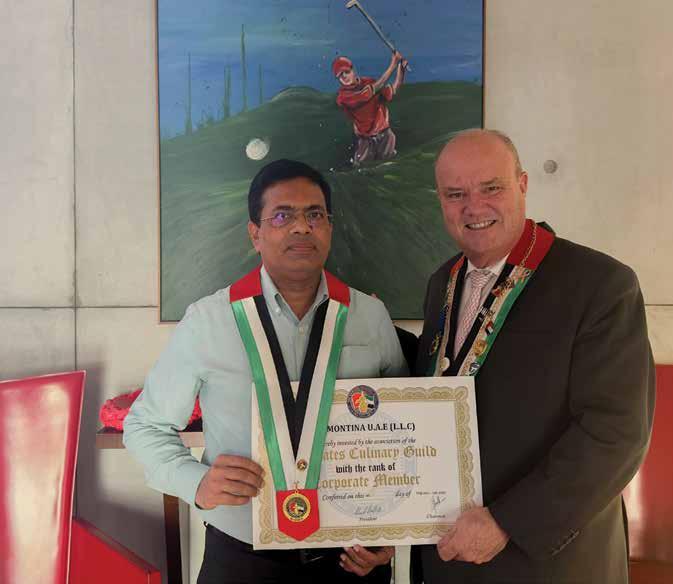
Tramontina stands as a leading provider of comprehensive solutions for the hospitality sector. With a rich legacy dating back to 1911, this Brazilian company has evolved into a cornerstone for distributing premium hospitality goods. Our diverse range encompasses top-notch cookware, precision cutlery, quality dinnerware, kitchen accessories, professional kitchen tools, and furniture.
With over 110 years of industry expertise, Tramontina maintains unwavering quality standards, boasts a diverse brand portfolio, and operates

with an innovative supply chain. Our dedicated team of over 10,000 employees enables us to manage a global presence, with 17 distribution centers worldwide.
The variety in our range, supported by the 10 factories in Brazil, along with the brand's steadfast commitment to quality, makes Tramontina a go-to destination for all hospitality needs. We stand as the definitive one-stop
solution, offering exceptional products and unparalleled service.
At Tramontina, we take pride in our unique capabilities, meticulously honed to surpass industry expectations. We eagerly anticipate the opportunity to enhance your hospitality experience with our exceptional products and an enduring commitment to excellence!
June-July 2024 Gulf Gourmet

Welcome back to Trends Express. Without further ado, let's jump on board the "Trends Express" and see what's hot and appearing in our region. Remember, "LIKE IT, BUY IT, SNAP IT, SHARE IT."
They're not complicated, but just a few simple ingredients will rock your culinary planet …..
Have you ever wondered if the next foods will be deconstructed and then restructured in a different form? Well, look no further as we say hello to the savoury doughnut.
Whether it's an Iraqi Sambusac, a Youtiao from China, an Empanada from Latin America or a Chebureki from the Caucasus, you can sink your teeth into crispy dough with soft inside, some with sticky glaze, loaded with flavours that really hit the note in this region such as jalapeno or cheddar, sour cream and onion jam. I even tried pesto and feta last week. Of course, it's not just about filling or topping the dough; it can be a mini pizza, ma'ajanat or bagel. What next as this trend hits the region, maybe doughnut sliders or even pulled chicken zaatar luqaimat. Yes, these kids have been around the block, but like a good pop song, it's playing again and again to newer generations of our customers. It's a trend that's appealing and winning diners over.
I'm sure you all have a great cup of joe (coffee). The sustainability trend is always here and now big for those who use coffee grinds. Yes, we all know they are great for the garden and plants. However, this trend is pushing chefs and baristas to think outside of the box. Did you know two billion cups of coffee are drunk every day around the world? 730 billion cups a year that means ……ten metric ton of spent coffee grounds…NOW, to combat this and enhance the experience of our customers, these spent grounds can be seen in granola, added to pancake batter, and used in rubs, marinades and sauces. Cookies, cakes, and brownies are added to the next level with a small amount of these grounds. The smoky, slightly bitter, nutty notes can take food to the next level, and this week, I tried sourdough bread with these grounds in it….AMAZING! It really is the new black, not only for our region but globally, a trend to watch, adapt and use… I'm going to try adding it to my peanut butter this week for my breakfast….WHAT WILL YOU TRY?
Life is like trends, sometimes full of surprises. Infused honey is storming here; we have seen hot honey, chipotle honey,
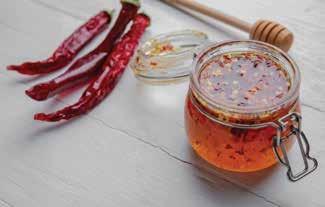
berry, lemon, and chocolate all infused with this spectacular golden nectar. But with onion seeds or black sesame. Apiarists(beekeepers) are looking to capture our taste buds, hearts and souls, and I am already won over. Cheese and honey are like salt and pepper or shawarma and hot sauce. These are profiles that work so well: zaatar honey or sumac honey lifts French toast. I was shocked and delighted at the same time as this trend is gathering speed and diversity of profiles. My mind is screaming for Madras-infused honey of fried chicken… sweet. Spicy, aromatic, crunchy, succulent… I'm drooling at the thoughts…….. I NEED THIS FOR MY LUNCH FOR SURE
This month, I've been reflecting on past and new trends, exploring tastes like white chocolate and curry powder lollies and scallops on semi-sweet vanilla mascarpone. I even tried the latest trend of eating my desserts first and finishing my meal with the starters as pioneered by Heston Blumenthal—a unique way to eat and sensually very different. HOWEVER, my problem is this: I never move off the first course due to my sweet tooth …GO ON TRY IT,` IT MIGHT SURPRISE YOU
Finally, our corporate partners at the Emirates Culinary Guild are also helping define the landscape of trends with their visions. Their foresight to avail their latest products to us at our monthly meetings, reflects both innovation and current market trends. Stay ahead of the curve, talk to them, and try their products. Join them and us in driving the trends in our region.
Kerry Foodservice provides custom-made solutions (coatings, sauces, beverages, etc.) and branded solutions such as Chef’s Palette and DaVinci Gourmet to global and regional chains, QSRs, and casual diners across the region.


